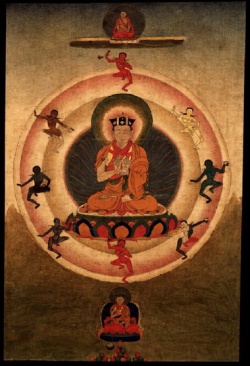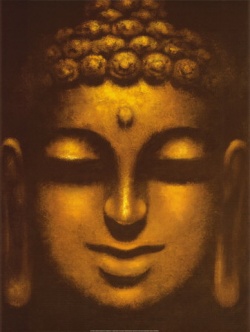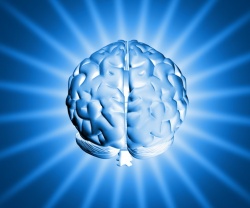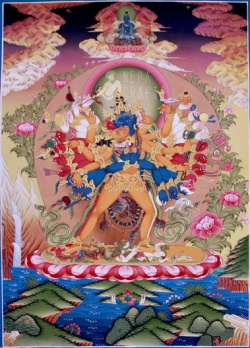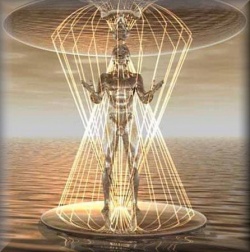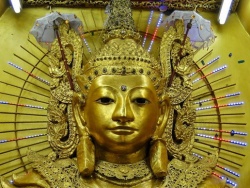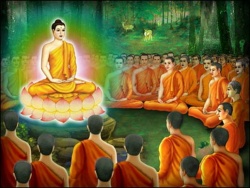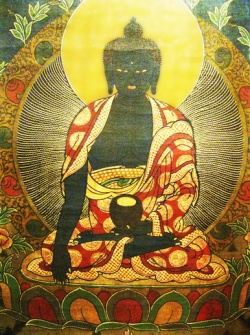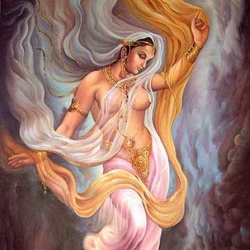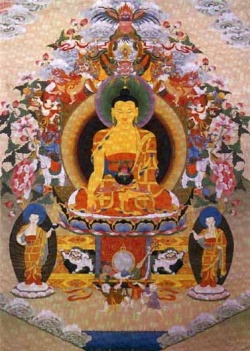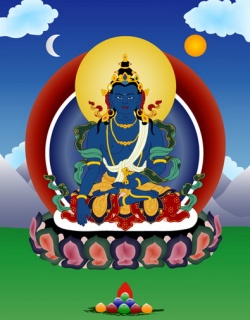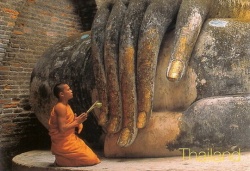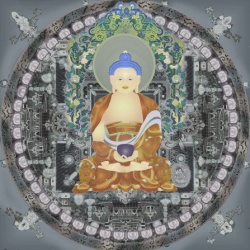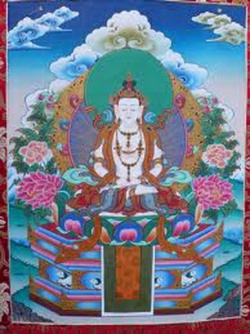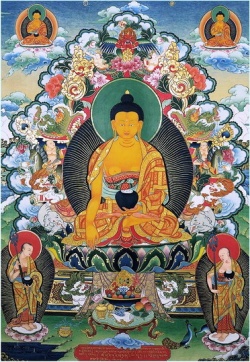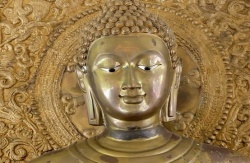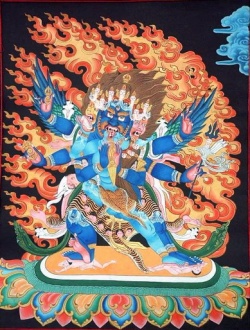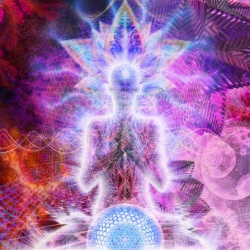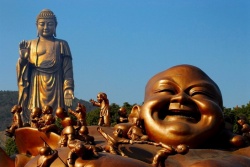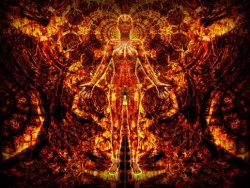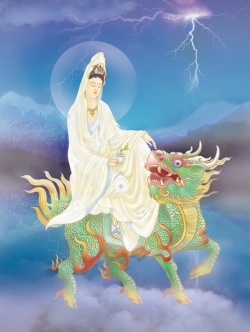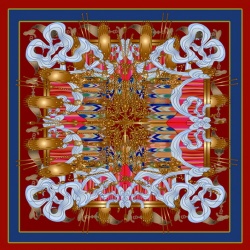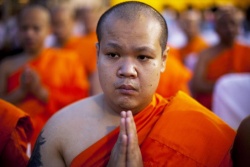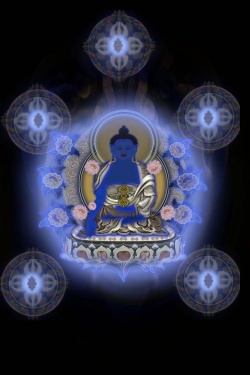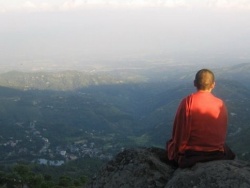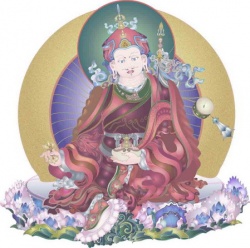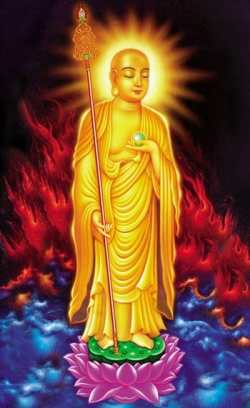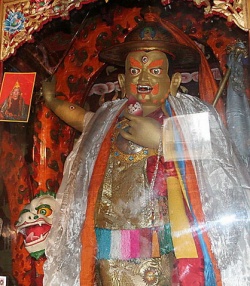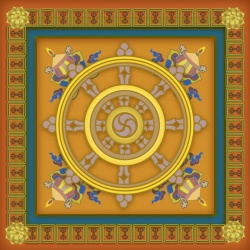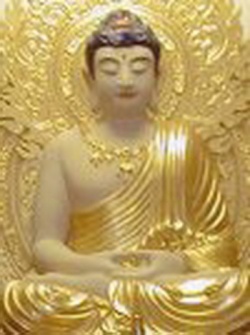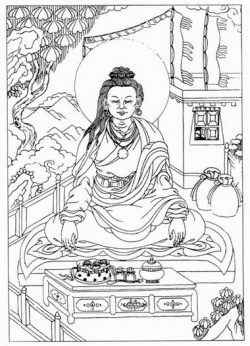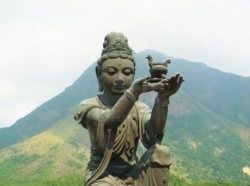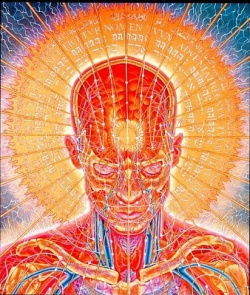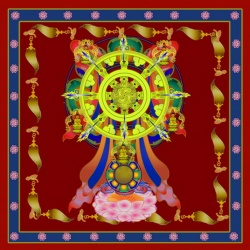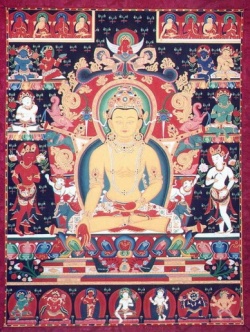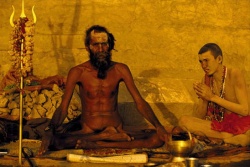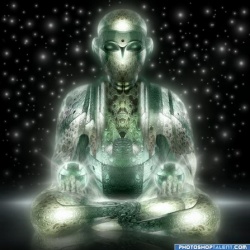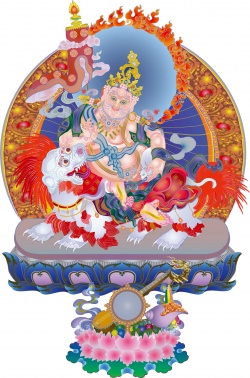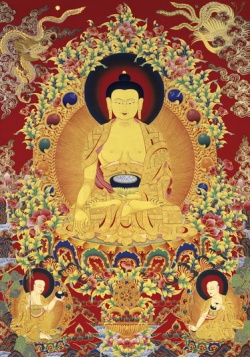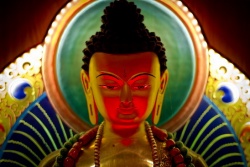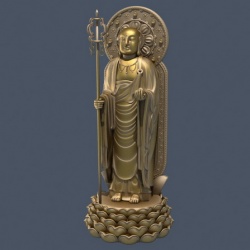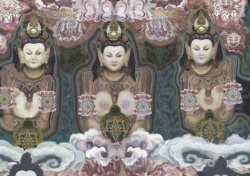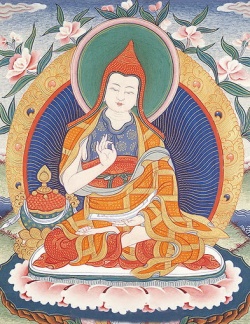The Laṅkāvatāra Sūtra by Daisetz Teitaro Suzuki: CHAPTER THREE. ON IMPERMANENCY
The Laṅkāvatāra Sūtra
A Mahāyāna Text
Translated for the first time from
the original Sanskrit by
Daisetz Teitaro Suzuki
Contents
- 1 LVII Three Forms of the Will-body (manomayakāya)
- 2 LVIII The Five Immediacies (pañcānantaryāṇi); Desire as Mother and Ignorance as Father
- 3 LX The Identity (samatā) of Buddhahood and its Four Aspects
- 4 LXI Not a Word Uttered by the Buddha; Self-realisation and an Eternally-abiding Reality
- 5 LXII On Being and Non-Being; Realism and Nihilism
- 6 LXIII Realisation and Word-teaching
- 7 LXIV Discrimination, an External World, Dualism, and Attachment
- 8 LXV The Relation between Words (ruta) and Meaning (artha)
- 9 LXVI On Knowledge, Absolute (jñāna) and Relative (vijñāna)
- 10 LXVII Nine Transformations (pariṇāma)
- 11 LXVIII The Deep-seated Attachment to Existence
- 12 LXIX Self-nature, Reality, Imagination, Truth of Solitude, etc
- 13 LXX The Thesis of No-birth
- 14 LXXI True Knowledge and Ignorance
- 15 LXXII Self-realisation and the Discoursing on it
- 16 LXXIII On the Lokāyatika
- 17 LXXIV Various Views of Nirvana
- 18 LXXV Is Tathagatahood Something Made? Its Relation to the Skandhas, to Emancipation, to Knowledge
- 19 LXXVI The Tathagata Variously Designated; Relation Between Words and Meaning; Not a Word Uttered by the Buddha
- 20 LXXVII Causation, No-birth, Self-mind, Nirvana
- 21 LXXVIII Verses on No-birth and Causation
- 22 LXXIX Various Views of Impermanency
- 23 Footnotes
- 24 Continue Reading
- 25 Source
LVII Three Forms of the Will-body (manomayakāya)
(136) At that time again the Blessed One said this to Mahāmati the Bodhisattva-Mahāsattva: I will tell you, Mahāmati, about the various forms of the will-body; listen well and reflect well within yourself. I will tell you.
Mahāmati the Bodhisattva-Mahāsattva said; I will, Blessed One, and gave ear to the Blessed One.
The Blessed One then said this: There are three kinds of will-body, Mahāmati.
What are the three? They are:
(1) the will-body obtained in the enjoyment of the Samādhi;
(2) the will-body obtained by recognising the self-nature of the Dharma; and
(3) the will-body which is assumed (by a Bodhisattva according to) the class of beings (to be saved) and which perfects and achieves (without a thought of its own achievement).
By realising the higher stages successively after the first is attained, the Yogin will experience them (all).
Now, Mahāmati, what is the will-body attained in the enjoyment of the Samādhi? It is this: when (the Yogin) in the third, fourth, fifth stages removes the various discriminations going on in his mind and is at rest,[1] the waves of consciousness are no more stirred in the Mind-ocean and the Vijñāna functions are quieted, the bliss of which is enjoyed by him; and when he thus recognises the non-existence of the external world, which is no more than his own mind, he is said to have the will-body.[2]
(137) What is the will-body obtained by recognising the self-nature of the Dharma? When (the Yogin) of the eighth stage has a thoroughgoing penetration into the nature of things which is like Māyā and not image-producing, he experiences a revulsion at the seat of consciousness and obtains the Samādhi known as Māyā-like and other Samādhis.
By entering upon the Samādhis he gains a body which exhibits various powers of self-mastery and supernatural activity, which moves according to his wish as quickly as a flower opens up, which resembles Māyā, a dream, and a reflected image, and which is not a product of the elements but has something analogous to what is produced of the elements, which is furnished with all the differences appertaining to the world of forms and yet is able to follow up all the assemblages in the Buddha-lands.
This is the body which has a thoroughgoing knowledge of the self-nature of the Dharma and for this reason is called will-body.
Now what is the will-body which is born in accordance with the class and which perfects and achieves? When (the Yogin) is thoroughly conversant with all the characteristics of self-realisation and its bliss which pervades the teachings of the Buddha, he is said to have the body which is will-made, born with (the class), perfecting and achieving. Mahāmati, you should exert yourself in order to have a thoroughly penetrating knowledge of these three marks of the will-body. So it is said:
1. My Mahāyāna is neither a vehicle, nor a sound, nor words; it is neither the truth, nor emancipation, nor the realm of imagelessness.
2. Yet the Mahāyāna is a vehicle on which the Samādhis are carried leading to various creative activities; the several forms of the will-body are adorned with the flowers of the sovereign will.
(137) What is the will-body obtained by recognising the self-nature of the Dharma? When (the Yogin) of the eighth stage has a thoroughgoing penetration into the nature of things which is like Māyā and not image-producing, he experiences a revulsion at the seat of consciousness and obtains the Samādhi known as Māyā-like and other Samādhis.
By entering upon the Samādhis he gains a body which exhibits various powers of self-mastery and supernatural activity, which moves according to his wish as quickly as a flower opens up, which resembles Māyā, a dream, and a reflected image, and which is not a product of the elements but has something analogous to what is produced of the elements, which is furnished with all the differences appertaining to the world of forms and yet is able to follow up all the assemblages in the Buddha-lands.
This is the body which has a thoroughgoing knowledge of the self-nature of the Dharma and for this reason is called will-body.
Now what is the will-body which is born in accordance with the class and which perfects and achieves? When (the Yogin) is thoroughly conversant with all the characteristics of self-realisation and its bliss which pervades the teachings of the Buddha, he is said to have the body which is will-made, born with (the class), perfecting and achieving. Mahāmati, you should exert yourself in order to have a thoroughly penetrating knowledge of these three marks of the will-body. So it is said:
1. My Mahāyāna is neither a vehicle, nor a sound, nor words; it is neither the truth, nor emancipation, nor the realm of imagelessness.
2. Yet the Mahāyāna is a vehicle on which the Samādhis are carried leading to various creative activities; the several forms of the will-body are adorned with the flowers of the sovereign will.
LVIII The Five Immediacies (pañcānantaryāṇi); Desire as Mother and Ignorance as Father
(138) At that time again Mahāmati the Bodhisattva-Mahāsattva said this to the Blessed One:
The five immediacies are preached by the Blessed One; and what are these five, Blessed One, which being committed by a son or a daughter of a good family cause them to fall into the Avici hell?
The Blessed One replied: Then, Mahāmati, listen well and reflect, for I will tell you.
Mahāmati the Bodhisattva-Mahāsattva said; Certainly, Blessed One, and gave ear to the Blessed One.
The Blessed One said thus to him: What are the five immediacies?
They are:
(1) the murdering of the mother,
(2) of the father,
(3) of the Arhat,
(4) the breaking-up of the Brotherhood, and
(5) causing the body of the Tathagata to bleed from malice.
Now what is meant by the mother of all beings?
It is desire which is procreative, going together with joy and anger and upholding all with motherliness. Ignorance representing fatherhood brings about one's rebirth in the six villages of the sense-world. When there takes place a complete destruction of both roots, fatherhood and motherhood, it is said that mother and father are murdered.
When there is a complete extermination of the subordinate group of passions such as anger, etc., which are like an enemy, a venomous rat, the murdering of the Arhat is said to take place.
What is meant by the breaking-up of the Brotherhood?
When there is a complete fundamental breaking-up of the combination of the Skandhas whose characteristic mark is a state of mutual dependence among dissimilarities, it is said that the Brotherhood is split up. (139) [
[[[Mahāmati]])], when the body of the eight Vijñānas, which erroneously recognises individuality and generality as being outside the Mind—which is seen (by the ignorant) in the form of an external world—is completely extirpated by means of faulty discriminations, that is, by means of the triple emancipation and the non-outflows, and when thus the faulty mentality of the Vijñāna-Buddha is made to bleed, it is known as an immediacy-deed. These,
Mahāmati, are the five inner immediacies, and when they are experienced by a son or a daughter of a good family, there is an immediacy-deed of realisation as regards the Dharma.
Further, Mahāmati, there are five external immediacies which I will point out to you, in order that you and other Bodhisattvas in the future may thereby be saved from ignorance. What are these five?
They are those immediacies which are described in the canonical texts, and those who commit these crimes can never experience any one of these manifestations, except those Transformation (-Buddhas) who are sustained by the power (of the Tathagatas) and have already attained a realisation.
The Śrāvakas of transformation, Mahāmati, who are sustained by the sustaining power either of the Bodhisattvas or Tathagatas, may see somebody else practising deeds of wickedness, and they will repeatedly make great efforts to turn him away from his wickness and faulty views, and to make him realise the non-reality of wickedness and faulty views by laying down his burden.
This is the way I demonstrate facts of the transformation, the sustaining power, and the realisation.
Mahāmati, there is, however, no realisation for those who are sheer offenders of the immediacies, (140) except when they come to the recognition of the truth that an external world is nothing but[3] the Mind itself, seeing that body, property, and abiding place are discriminations, and that the notion of an ego and its belongings are to be kept away; or, when they are released from the fault of self-discrimination by encountering a good friend at some time or other, or at any time, and being born in some other path of existence. So it is said:
3. Desire is said to be the mother and ignorance the father; the Vijñāna which recognises an objective world is (compared to) the Buddha.
4. The secondary group of passions is the Arhat, the amassing of the five Skandhas the Brotherhood; as these are to be destroyed immediately they are known as immediacy-deeds.
The Buddha-nature (buddhatā)
Again Mahāmati said: Pray tell me, Blessed One, what makes the Buddhas and the Blessed Ones such as they are: that is, (what is) the Buddha-nature of the Buddhas?[4]
Said the Blessed One: when the egolessness of things as well as of persons is understood, when the knowledge of the twofold hindrance is thoroughly taken hold of, when the twofold death (cyuti) is accomplished, and when the twofold group of passions is destroyed, there, Mahāmati, is the Buddha-nature of the Buddhas and the Blessed Ones. When these teachings are experienced by the Śrāvakas and Pratyekabuddhas, this is their Buddha-nature. So it is said:
5. The twofold egolessness, the twofold group of passions, the twofold hindrance, and the inconceivable transformation-death, —when these are attained, there is the Tathagata.
LX The Identity (samatā) of Buddhahood and its Four Aspects
(141) At that time again, Mahāmati the Bodhisattva-Mahāsattva said this to the Blessed One:
According to what deeper sense[5] did you make this announcement before the congregation, that "I am all the Buddhas of the past," and that "I have gone through many a birth in varieties of forms, being thus at times the king Māndhātṛi, Elephant, Parrot, Indra, Vyāsa, Sunetra, and other beings in my one hundred thousand births?"
Said the Blessed One: There are, according to the deeper sense, four kinds of sameness distinguished, Mahāmati, and the Tathagatas, Arhats, Fully-Enlightened Ones make this assertion: I was thus at that time the Buddha Krakucchanda, Kanakamuni, and Kāśyapa.
What are the four kinds of sameness which are distinguished according to the deeper sense?
They are:
(1) sameness of letters,
(2) sameness of words,
(3) sameness of teachings, and
According to this fourfold sameness in the deeper sense, the Tathagatas, Arhats, Fully-Enlightened Ones make the announcement before the congregation.
Now, Mahāmati, what is the sameness of letters? It is that my name is (spelt) B-u-d-d-h-a, and these letters are also used for other Buddhas and Blessed Ones; Mahāmati, these letters in their nature are not to be distinguished one from another; therefore, Mahāmati, there is the sameness of letters.
Now, Mahāmati, what is the sameness of words with regard to the Tathagatas, Arhats, and (142) Fully-Enlightened Ones?
It is that sixty-four sounds of the Brahman language are distinguished by me, and these identical sixty-four sounds of the Brahman language are also uttered by the Tathagatas, Arhats, and Fully-Enlightened Ones, and their Kalaviṅka-like notes are the same with all of us, as we are indistinguishable in this respect.
Now, Mahāmati, what is the sameness of the body? It is that I and other Tathagatas, Arhats, Fully-Enlightened Ones are the same as regards our Dharmakāya and the (thirty-two) signs and the (eighty) minor excellencies of bodily perfection—no distinction existing among us, except that the Tathagatas manifest varieties of forms according to the different dispositions of beings, who are to be disciplined by varieties of means.
Now, Mahāmati, what is the sameness of the teaching? It is that I as well as they (other Tathagatas) are all conversant with the teachings belonging to the thirty-seven branches of enlightenment.
According to the deeper sense which is concerned with this fourfold sameness, the Tathagatas, Arhats, Fully-Enlightened Ones make their announcement before the congregation. So it is said:
6. "I am Kāśyapa, Krakucchanda, and Kanakamuni"; this I preach who come out of the sameness for the sake of the sons of the Buddha.
LXI Not a Word Uttered by the Buddha; Self-realisation and an Eternally-abiding Reality
Again Mahāmati said: It is said by the Blessed One that from the night of the Enlightenment till the night of the Parinirvana, the Tathagata (143) in the meantime has not uttered even a word, nor will he ever utter; for not-speaking is the Buddha's speaking.
According to what deeper sense is it that not-speaking is the Buddha's speaking?
The Blessed One replied: By reason of two things of the deeper sense, Mahāmati, this statement is made.
What are the two things:
They are the truth of self-realisation and an eternally-abiding reality. According to these two things of the deeper sense the statement is made by me.
Of what deeper sense is the truth of self-realisation?
What has been realised by the Tathagatas, that is my own realisation, in which there is neither decreasing nor increasing; for the realm of self-realisation is free from words and discriminations, having nothing to do with dualistic terminology.
What is meant by an eternally-abiding reality?
The ancient road of reality, Mahāmati, has been here all the time, like gold, silver, or pearl preserved in the mine, Mahāmati;
the Dharmadhātu abides foreover, whether the Tathagata appears in the world or not; as the Tathagata eternally abides so does the reason (dharmatā) of all things; reality foreover abides, reality keeps its order, like the roads in an ancient city.
For instance, Mahāmati, a man who is walking in a forest and discovering an ancient city with its orderly streets may enter into the city, and having entered into it, he may have a rest, conduct himself like a citizen, and enjoy all the pleasures accruing therefrom. (144) What do you think, Mahāmati? Did this man make the road along which he enters into the city, and also the various things in the city?
Mahāmati said: No, Blessed One.
The Blessed One said: Just so, Mahāmati, what has been realised by myself and other Tathagatas is this reality, the eternally-abiding reality (sthititā), the self-regulating reality (niyāmatā), the suchness of things (tathatā), the realness of things (bhūtatā), the truth itself (satyatā).
For this reason, Mahāmati, it is stated by me that from the night of the Tathagata's Enlightenment till the night of his entrance into Nirvana, he has not in the meantime uttered, nor ever will utter, one word. So it is said:
7. From the night of Enlightenment till that of Nirvana, I have not in the meantime made any proclamation whatever.[6]
8. It is on account of the deeper meaning that the eternally-abiding reality of self-realisation is talked of by me; and between myself and (all the other) Buddhas, in this respect, there is no distinction whatever.
LXII On Being and Non-Being; Realism and Nihilism
At that time, Mahāmati made this request of the Blessed One: Pray tell me, Blessed One, about the being and non-being of all things; and when myself and other Bodhisattva-Mahāsattvas are freed of the notions of being and non-being, may we quickly attain supreme enlightenment.
(145) The Blessed One replied: Then, Mahāmati, listen well and reflect well within yourself; I will tell you.
Mahāmati the Bodhisattva-Mahāsattva said, Certainly, Blessed One, and gave ear to the Blessed One.
Then the Blessed One said: People of this world are dependent on two things, Mahāmati, that is, they are dependent on the idea of being and on that of non-being, and they fall into the views whereby they take pleasure either in nihilism or in realism.
They imagine emancipation where there is no emancipation.
Now, Mahāmati, who are the people dependent on the notion of being?
It means this that they regard the world as rising from causation which is really existent, and that the actually existing and becoming world does not take its rise from causation which is non-existent. This will not be the case if the world is something non-existing.
They thus talk of the really-existing world as arising from the reality of causation.
This is the realistic view of causation as held by some people.
Now, Mahāmati, what is meant by being dependent upon the idea of non-being? It means, Mahāmati, admitting greed, anger, and folly, and yet discriminating as regards the non-reality of what makes up greed, anger, and folly; and, Mahāmati, there is one who does not admit the reality of things because of their being devoid of individual marks; and there is another who, seeing that the Buddhas, Śrāvakas, and Pratyekabuddhas are free from greed, anger, and folly, because of all things being devoid of individual marks, (think that greed, anger, and folly) do not exist.
Now, Mahāmati, who of these is the one doomed to ruin?
Said Mahāmati; Blessed One, it is he who, admitting greed, anger, and folly, yet refuses to admit them.
(146) The Blessed One said: Well said indeed, Mahāmati! Again thou hast indeed spoken well, Mahāmati!
Not only is he himself doomed to ruin because of his notion of greed, anger, and folly as existent and yet as not-existent, but he ruins even the character of the Buddha, the Śrāvaka, and the Pratyekabuddha.
Why? Because the passions are not to be taken hold of innerly and outwardly, because they are neither different nor not-different. Mahāmati, greed, anger, and folly too are not to be taken hold of innerly as well as outwardly; they have no substance of their own and they are not to be admitted;
Mahāmati, as there is no reality in the nature of greed, anger, and folly, (he who fails to understand this) is the one who ruins the character of the Buddha, Śrāvaka, and Pratyekabuddha.
The Buddha, Śrāvaka, and Pratyekabuddha are by nature emancipated as there is in them no cause for being bound and binding; Mahāmati, (on the other hand,) where there is a state of being bound there are the binding and the cause of bondage. (And yet there is) one who talks thus, (that is, denies causation); such is doomed to ruin. Mahāmati, this characterises nihilism and realism.
This is stated by me in accordance with the deeper sense. It is better to cherish the notion of an ego-substance as much as Mount Sumeru than to have the notion of emptiness derived from the self-conceited view of being and non-being. One who is conceited in the view of being and non-being is indeed doomed to ruin.
Those who are delighted in cherishing notions of individuality and generality fail to understand that an external world is nothing but Mind itself and has no reality; and as they do not understand this they regard things external as transient, for they suffer every moment changes which follow one after another, now splitting, now dividing, while the Skandhas, Dhātus, and Āyatanas succeeding one another and combining with one another, now come forward and (147) now pass away.
They who thus disregarding words of the scriptures are given up to wrong discriminations are also doomed to ruin. So it is said:
9. As far as the duality of being and non-being extends, there is the realm of intellection; when this realm vanishes, intellection completely ceases.
10. When the external world is not grasped (as real) there is neither causation nor reality; there is the essence of suchness (thatatā), which is the (spiritual) realm of the wise.
11. Those who believe in the birth of something that has never been in existence and, coming to exist, finally vanishes away, —which leads them to assert that things come to exist, things pass away, according to causation, —such people have no foothold in my teaching.
12. It is not by the philosophers, not by the Buddhas, not by myself, not by anybody else, but by causation that being obtains; how can one talk of non-being?
13. When being obtains by causation, who can bring about non-being? By reason of the wrong views based on the doctrine of birth, being and non-being are discriminated.
14. When it is realised that there is nothing born, nothing passing away, there is no way to admit its being and not-being; the world is to be regarded as quiescent.
LXIII Realisation and Word-teaching
At that time again Mahāmati the Bodhisattva-Mahāsattva requested of the Blessed One, saying: Pray point out to me, Blessed One; pray point out to me, Sugata; pray point out to me, Tathagata, Arhat, Fully-Enlightened One! Pray tell me, Most Excellent One! (148)
What is the characteristic of the realisation by which I and other Bodhisattva-Mahāsattvas, becoming thoroughly conversant with its meaning, may quickly attain the highest enlightenment, and, relying upon themselves, will not be led away by any speculations or philosophies?
Said the Blessed One: Then listen well, Mahāmati, and well reflect within yourself; I will tell you.
Mahāmati the Bodhisattva-Mahāsattva said; Certainly, I will; and gave ear to the Blessed One.
Thereupon the Blessed One said this:
There are two ways of characterising the realisation attained by all the Śrāvakas, the Pratyekabuddhas, and the Bodhisattvas: the realisation itself and the teaching (about it).
Now, Mahāmati, by the realisation itself is meant that it is the realm of inner attainment; its characteristic features are that it has nothing to do with words, discriminations, and letters; that it leads one up to the realm of non-outflows; that it is the state of an inner experience; that it is entirely devoid of philosophical speculations and (the doings of) evil beings; and that, destroying philosophical speculations and (the doings of) evil beings, it shines out in its own inner light of attainment. These, Mahāmati, are the characteristics of the realisation.
Now, Mahāmati, what is meant by the teaching (concerning it)? It is variously given in the nine divisions of the doctrinal works; it keeps one away from the dualistic notions of being and non-being, of oneness and otherness; first making use of skilful means and expedients, it induces all beings to have a perception (of this teaching) so that whoever is inclined towards it, may be instructed in it. This, Mahāmati, is the characteristic of the teaching. Let, therefore, Mahāmati, you and other Bodhisattva-Mahāsattvas (149) exert yourselves in this.
15. Realisation and teaching, self-attainment and doctrinal instruction—those who have an insight into the difference will not be led away by philosophical authorities.
16. There is no truth in any object that is imagined by the ignorant; deliverance is where there is no objective world; why is this not sought by the speculators?
17. The world of the Saṁskritas is observed as the continuation of birth-and-death, whereby dualisms are nourished, and because of this perversion (the truth) is not perceived.
18. There is just one truth, which is Nirvana—it has nothing to do with the Manas (intellection); the world seen as subject to discrimination resembles a plantain tree, a dream,[7] a vision.
19. No greed there is, no anger, nor folly either, and again, no personal ego; from desire start the Skandhas, which resemble a dream.
LXIV Discrimination, an External World, Dualism, and Attachment
At that time again Mahāmati the Bodhisattva-Mahāsattva requested of the Blessed One, saying: Pray tell me, Blessed One, pray tell me, Sugata, regarding what characterises wrong discrimination (abhūtaparikalpa).
Blessed One, tell me as to the how, what, why, and who of wrong discrimination, which, when rising and going on, constitutes what is known as wrong discrimination; that is to say, to what kind of thought is the term wrong discrimination applicable? or what kind of discrimination is to be called wrong?
(150) The Blessed One said: Well said, well said, Mahāmati; and again, well said, indeed, Mahāmati!
You who have been admitted (into the order of Bodhisattvas), Mahāmati, think of this matter which is worth asking about, for the welfare of many people, for the happiness of many people, because of your compassion for the world, for the benefit of the multitudes, for the welfare and happiness of celestial beings and humankind.
Therefore, Mahāmati, listen well and reflect well within yourself as I tell you.
Certainly, Blessed One; said Mahāmati the Bodhisattva-Mahāsattva, and gave ear to the Blessed One.
Then the Blessed One said thus to him: When the multitudinousness of objects is wrongly imagined (as real) and attached to, discrimination goes on evolving; and, Mahāmati, as people are attached tenaciously to the notion of grasping, as they have not ascertained in their minds as to the nature of the objective world which is no more than the Mind itself, as they have fallen into the dualistic view of being and non-being, and,
Mahāmati, as they are nourished by the habit-energy of the views and discriminations of the philosophers, they perceive the multitudinousness of external objects (as real) and become attached to them; and for this reason a system of mentation—mind and what belongs to it —is discriminated and is spoken of (as real), and with the assertion of an ego-soul and its belongings, the system goes on functioning.
Said Mahāmati: As you say, Blessed One, when the multitudinousness of external objects is wrongly imagined (as real) and attached to by people, discrimination goes evolving on; and they fall into the dualistic view of being and non-being,[8]they nourish the views and discriminations of the philosophers which are based on the notion of grasped and grasping;
(151) and as they perceive the multitudinousness of external objects (as real) and become attached to them, a system of mentation—mind and what belongs to it —is discriminated and is spoken of (as real) and goes on functioning owing to the fact that the external world is not recognised as nothing but the Mind itself, and that the multitudinousness of things is tenaciously clung to as subject to (the notion of) being and non-being.
This being the case, Blessed One, the multitudinousness of external objects which is characterised with the dualism of being and non-being, is to be said neither existent nor non-existent, and does not render itself to the formation of the philosophical views.
(Inasmuch as the external world owes its existence to discrimination, it in itself must be said to be devoid of all forms of dualism.) Blessed One, in the same way the highest reality is declared to be devoid of (all forms of logical analysis such as) the means of proof, sense-perception, syllogistic arguments, illustration, reasoning, etc.
How is it, Blessed One, that while, on the one hand, the discrimination of multiplicity is said to go on operating on the strength of the attachment which attaches itself to the multiplicity of external unrealities, the attachment, on the other hand, to the highest reality does not give rise to discrimination which goes on functioning in its own way? Is it not, Blessed One, unfair reasoning on your part to say, "It gives rise (to discrimination)"
in one place, and to say in another place, "It does not"? [9]According to the Blessed One, depending on and attaching to the dualism of being and non-being, there evolve views characteristic of wrong discrimination as when the magician produces varieties of people that are not at all real and complete objects.
Thus signs of existence and non-existence are falsely imagined and go on so imagined; (but in fact existence itself is) devoid of discrimination. If so, how does one come to cherish the dualism as held by a man of the world?
Said the Blessed One: Mahāmati, discrimination, indeed, does not evolve, nor is it put away. Why?
Because there is no evolving of discrimination as regards being and non-being; because the perception of objective realities is not real; because all that is seen is to be recognised as nothing but the Mind itself. (152)
Mahāmati, discrimination does not evolve, nor is it put away.
But, Mahāmati, for the sake of the ignorant who are addicted to discriminating the multiplicity of things which are of their own Mind, it is said by me that discrimination whose first function is to produce effects takes its rise owing to the attachment to the aspect of multiplicity as characteristic of objects.
How otherwise, Mahāmati, can the ignorant and simple-minded have an insight into the Mind itself which they discriminate, and see themselves freed from the notion of an ego and what belongs to it, and also freed from the wrong conception of cause and effect?
And, again, how can they recognise that there is nothing but Mind itself and cause a revulsion at the inmost seat of consciousness (cittāśraya)? How can they have a clear perception of all the stages and attain the inner realisation of the Tathagatas, which transcends the five Dharmas, the three Svabhāvas, and the idea of reality as well as discrimination?
For this reason, Mahāmati, I state that discrimination takes its rise from our attachment to the multiplicity of objects which are not real, and that emancipation comes from our thoroughly understanding the meaning of reality as it is and also the meaning of multiplicity of things which evolve from discrimination. So it is said:
20. Those who, regarding the world as evolving from causes and conditions, are attached to these notions as well as to the fourfold proposition, fail to understand my teaching.
21. The world cannot be predicated anywhere as being, or as non-being, or as being-and-non-being, as is discriminated by the ignorant who regard it as subject to causes and conditions,
22. When the world is seen (to be unpredictable with such notions as) being, non-being, or being-and-non-being, (153) a change takes place in the mind, and egolessness is attained.
23. All things are unborn because they are born of causation; anything that is born of causation is an effect, and from an effect nothing is produced.
24. From an effect no effect is produced; (if you assert this,) you commit the fault of a double effect; and this double effect being untenable, no existence comes from an effect.
25. When the Saṁskṛita (i. e. anything produced) is regarded as free from (the dualism of) depended and depending, there decidedly is Mind-only, and hence my teaching of Mind-only.
26. The (Mind as) norm is the abode of self-nature which has nothing to do with a world of causation; of this norm which is perfect existence and the highest Brahma, [10] I speak.
27. An ego-soul is a truth belonging to thought-construction, in which there is no real reality; the self-nature of the Skandhas is also a thought-construction, as there is no reality in it.
28. The sameness is of four kinds: individual forms, cause, the coming into being,[11] and the sameness of non-ego is the fourth: these are subjects of discipline for the Yogins.
29. (There is a state which is) removed from all philosophical views, free from imagined and imagining, of no attainment, and of no birth—this I call Mind-norm.
30. Of neither existence nor non-existence do I speak, but of Mind-only which has nothing to do with existence and non-existence, and which is thus[12] free from intellection.
(154) 31. Suchness (tathatā), emptiness, realm of truth (dharmadhātu), the various forms of the will-body— these I call Mind-only.
32. Multiplicity of objects evolves from the conjunction of habit-energy and discrimination; it is born of Mind, but is regarded by people as existing outwardly: this I call Mind-only.
33. The external world is not, and multiplicity of objects is what is seen of Mind; body, property, and abode— these I call Mind-only.
LXV The Relation between Words (ruta) and Meaning (artha)
At that time Mahāmati the Bodhisattva-Mahāsattva said this to the Blessed One: This is said by the Blessed One that the Bodhisattva-Mahāsattva and others should not grasp meaning (or reality, artha), according to words. But, Blessed One, why should not the Bodhisattva-Mahāsattva grasp meaning from words? What are words? What is meaning?
Said the Blessed One: Then, Mahāmati, listen well and reflect within yourself well; I will tell you.
Thereupon said Mahāmati the Bodhisattva-Mahāsattva, Certainly, Blessed One; and gave ear to the Blessed One.
The Blessed One then said this to him:
Now, Mahāmati, how is speech produced? Depending on discrimination and habit-energy (or memory) as the cause, there is the conjunction and the distinction of sounds and letters, which, issuing from the teeth, jaws, palate, tongue, lips, and the cavity of the mouth, make mutual conversations possible.
This is speech.
Now, Mahāmati, what is meaning? (155) The Bodhisattva-Mahāsattva is said to have grasped meaning well, when, all alone in a lonely place, he walks the path leading to Nirvana, by means of his transcendental wisdom (prajñā) which grows from learning, thinking, and meditation, and causing a revulsion first at the source of habit-energy by his self-knowledge (svabuddhi), abides on the stages of self-realisation where he leads a life full of excellent deeds.
Further, Mahāmati, the Bodhisattva-Mahāsattva who is conversant with words and meaning observes that words are neither different nor not-different from meaning and that meaning stands in the same relation to words. If, Mahāmati, meaning is different from words, it will not be made manifest by means of words; but meaning is entered into by words as things (are revealed) by a lamp. It is, Mahāmati, like a man carrying a lamp to look after his property. (By means of this light) he can say:
This is my property and so is kept in this place. Just so, Mahāmati, by means of the lamp of words and speech originating from discrimination, the Bodhisattva-Mahāsattvas can enter into the exalted state of self-realisation which is free from speech-discrimination.
Further, Mahāmati, if a man becomes attached to the (literal) meaning or words and holds fast to their agreement in regard to the original state of Nirvana which is unborn and undying, the Triple vehicle, the one vehicle, the five (Dharmas),
mentation, the (three) Svabhāvas, etc., he will come to cherish views either affirmative or negative. As varieties of objects are seen in Māyā and are discriminated (as real), statements are erroneously made, discriminations erroneously go on. (156) It is by the ignorant that discriminations thus go on; it is otherwise with the wise.[13]
So it is said:
34. [14]Those who following words, discriminate and assert various notions, are bound for hell because of their assertions.
35. The ego-soul is not with the Skandhas, nor are the Skandhas in the ego-soul. They are not as they are discriminated, nor are they otherwise.
36. The reality of objects is seen being discriminated by the ignorant; if it were so as they are seen, all would be seeing the truth.
37. As all things are unreal, there is neither defilement nor purity; things are not as they are seen, nor are they otherwise.
LXVI On Knowledge, Absolute (jñāna) and Relative (vijñāna)
Further, Mahāmati, I will tell you about the features of Jñāna (absolute knowledge) and Vijñāna (relative knowledge)[15]; and when you and other Bodhisattva-Mahāsattvas are well conversant with these distinctive features of Jñāna and Vijñāna, you will quickly realise supreme enlightenment. There are three kinds of Jñāna—worldly, super-worldly, and transcendental. Now, worldly knowledge belongs to the philosophers and to the ignorant and simple-minded who are attached to the dualistic views of being and non-being. Super-worldly knowledge belongs to all the Śrāvakas and Pratyekabuddhas who are attached to the notions of individuality and generality. Transcendental knowledge which is free from the dualism of being and non-being, belongs to the Bodhisattvas and takes its rise when they thoroughly examine things of imagelessness, see into the state of no-birth and no-annihilation, and realise egolessness at the stage of Tathagatahood.[16]
(157) Vijñāna is subject to birth and destruction, and Jñāna is not subject to birth and destruction. Further, Mahāmati, Vijñāna falls into (the dualism of) form and no-form, being and non-being, and is characterised with multiplicity; but Jñāna is marked with the transcendence of (the dualism of) form and no-form. Further, Mahāmati, Vijñāna is characterised with accumulation and Jñāna with non-accumulation. Jñāna is of three kinds: that which assertains individuality and generality, that which assertains birth and decay, and that which assertains no-birth and no-decay.
Further, Mahāmati, Jñāna is devoid of attachment; Vijñāna attaches itself to the multitudinousness of objects. Again, Vijñāna is produced from the concordance of the triple combination;[17] Jñāna, in its self-nature, has nothing to do with combination or concordance. Again, Mahāmati,[18] Jñāna is characterised with unattainability; it is the inner state of self-realisation by noble wisdom, (158) and as it neither enters nor goes out, it is like the moon in water. So it is said:
38. Karma is accumulated by Citta, and discriminated by Jñāna; and one acquires by Prajñā the state of imagelessness and the powers.
39. Citta is bound up with an objective world, Jñāna evolves with reflection; and Prajñā evolves in the exalted state of imagelessness and in the excellent conditions.
40. Citta, Manas, and Vijñāna are devoid of thoughts and discriminations;[19] it is the Śrāvakas and not the Bodhisattvas that try to reach reality by means of discrimination.
41. The Tathagata's Jñāna is pure, (resting) in quietude in the most excellent patience (or recognition of truth); it is productive of excellent sense and is devoid of purposive-ness (samudācāra-varijitam).
42. Prajñā, with me, is of three kinds; whereby the wise grow powerful, individual signs are discriminated, and all things are manifested.[20]
43. My Prajñā has nothing to do with the two vehicles, it excludes the world of beings; that of the Śrāvakas evolves from their attachment to the world of beings; the Tathagata's Prajñā is spotless[21] because of its being in accord with Mind-only.
LXVII Nine Transformations (pariṇāma)
Further, Mahāmati, there are nine kinds of transformation as held by the philosophers endorsing the doctrine of transformation. They are: (1) the transformation of form; (159) (2) the transformation of characteristics; (3) the transformation of cause; (4) the transformation of concordance; (5) the transformation of view; (6) the transformation of origin; (7) the transformation of nature; (8) the transformation of manifest conditions; and (9) the transformation of manifest work. These, Mahāmati, are the nine views of transformation expounded by all the philosophers in accordance with their secret teaching, and they are all founded upon the dualism of being and non-being.
Now, Mahāmati, by the transformation of form is meant the alteration of form in appearance as gold takes various shapes when made into all kinds of ornament. For example: gold is seen made into a bracelet, a necklace, a fylfot, or what not; though the gold itself remains the same, varieties of articles (made of it) are all different in form, that is, in their transformations. In the same way, Mahāmati, there is a general transformation of things which is discriminated by other philosophers as coming from a causal agency. They are not right, nor are they otherwise. All differentiation in transformation is to be regarded as due to discrimination, such as the thickening of milk into curds and the ripening of fruit into a liquor. Mahāmati, like this thickening and ripening each transformation is a transformation rising from discrimination, which is discriminated by the philosophers; really there is nothing transformed, for the external objects of which being and non-being are discriminated, are what is seen of Mind itself and have no reality of their own. In the same way, Mahāmati, what is regarded by the ignorant and simple-minded as the evolving of objects is no more than the discrimination of their own mind, and, (160) Mahāmati, there is really nothing evolving, nothing disappearing, as it is like seeing things that evolve in a vision and a dream. Mahāmati, it is like perceiving the rise and disappearance of things in a dream; it is like the birth and death of a barren woman's child. So it is said:
44. The transformation of the form in time, and the embracing (of the soul) in the elements and sense-organs, which is in its middle-way existence (antarābhava)—they who (thus) imagine (the birth of a child) are not wise men.
45. The Buddhas do not discriminate the world as subject to the chain of origination; but they regard the causation which rules this world as something like the city of the Gandharvas.
LXVIII The Deep-seated Attachment to Existence
At that time, Mahāmati the Bodhisattva-Mahāsattva asked the Blessed One to explain concerning the deep-seated attachment to the existence of all things and the way of emancipation, saying: Pray tell me, Blessed One, pray tell me Tathagata, Arhat, Fully-Enlightened One, concerning the characteristics of our deep attachment to existence and of our detachment from it. When I and other Bodhisattva-Mahāsattvas understand well the distinction between attachment and detachment, we shall know what is the skilful means concerning them, and shall no more become attached to words according to which we grasp meaning. When we understand well what is meant by attachment to the existence of all things and the detachment from them, we shall destroy our discrimination of words and letters; and, by means of our wisdom (buddhi), enter into all the Buddha-lands and assemblies; be well stamped with the stamp of the powers, the self-control, the psychic faculties, and the Dhāranīs; and, well furnished with the wisdom (buddhi) in the ten inexhaustible vows and shining with varieties of rays pertaining to the Transformation Body, (161) behave ourselves with effortlessness like the moon, the sun, the jewel, and the elements; and hold such views at every stage as are free from all the signs of self-discrimination; and, seeing that all things are like a dream, like Māyā, etc., (shall be able to) enter the stage and abode of Buddhahood, and deliver discourses on the Dharma in the world of all beings and ill accordance with their needs, and free them from the dualistic notion of being and non-being in the contemplation of all things which are like a dream and Māyā, and free them also from the false discrimination of birth and destruction; and. finally, (shall be able to) establish ourselves where there is a revulsion at the deepest recesses (of our consciousness), which is more than words (can express).
Said the Blessed One: Well said, well said, Mahāmati! Listen well to me then, Mahāmati, and reflect well within yourself; I will tell you.
Mahāmati the Bodhisattva-Mahāsattva said, Certainly, I will, Blessed One; and gave ear to the Blessed One.
The Blessed One said to him thus: Mahāmati, immeasurable is our deep-seated attachment to the existence of all things the significance of which we try to understand after words. For instance, there are the deep-seated attachments to signs of individuality, to causation, to the notion of being and non-being, to the discrimination of birth and no-birth, to the discrimination of cessation and no-cessation, to the discrimination of vehicle and no-vehicle, of Saṁskṛita and Asaṁskṛita, of the characteristics of the stages and no-stages, and the attachment to discrimination itself, and to that arising from enlightenment, the attachment to the discrimination of being and non-being on which the philosophers are so dependent, and the attachment to the triple vehicle and the one vehicle, which are discriminated.
These and others, Mahāmati, are the deep-seated attachments cherished by the ignorant and simple-minded (162) to their discriminations. Tenaciously attaching themselves to these the ignorant and simple-minded go on ever discriminating like the silk-worms who, with their own thread of discrimination and attachment, enwrap not only themselves but others and are charmed with the thread; and thus they are ever tenaciously attached to the notions of existence and non-existence. (But really) Mahāmati, there are no signs here of deep-seated attachment or detachment. All things are to be seen as abiding in solitude where there is no evolving of discrimination. Mahāmati, the Bodhisattva-Mahāsattva should have his abode where he can see all things from the viewpoint of solitude.
Further, Mahāmati, when the existence and non-existence of the external world are understood to be due to the seeing of the Mind itself in these signs, (the Bodhisattva) can enter upon the state of imagelessness where Mind-only is, and (there) see into the solitude which characterises the discrimination of all things as being and non-being and the deep-seated attachments resulting therefrom. This being so, there are in all things no signs of a deep-rooted attachment or of detachment. Here, Mahāmati, is nobody in bondage, nobody in emancipation, except those who by reason of their perverted wisdom[22] recognise bondage and emancipation. Why? Because in all things neither being nor non-being is to be taken hold of.
Further, Mahāmati, there are three attachments deep-seated in the minds of the ignorant and simple-minded. They are greed, anger, and folly; and thus there is desire which is procreative and is accompanied by joy and greed; closely attached to this there takes place a succession of births in the (five) paths. Thus there are the five paths of existence for all beings who are found closely attached (to greed, anger, and folly). When one is cut off from this attachment, (163) no signs will be seen indicative of attachment or of non-attachment.
Further, Mahāmati, depending upon and attaching to the triple combination which works in unison, there is the continuation of the Vijñānas incessantly functioning; and because of the attachment there is a continued and deep-felt assertion of existence. When the triple combination which causes the functioning of the Vijñānas no more takes place, there is the triple emancipation, and when this is kept in view, there is no rising of any combination. So it is said:
46. The imagining of things not existent—this is characteristic of attachment (deeply seated in all beings); when the truth of this is thoroughly understood, the net of attachment is cleared away.
47. The ignorant take hold of the knowledge of existence according to words and are bound up like the silk-worm with their own discriminations; hence their ignorance of attachment (deeply seated in their minds).
LXIX Self-nature, Reality, Imagination, Truth of Solitude, etc
Further, Mahāmati said: According to the Blessed One, in all things that are variously discriminated by discrimination there is no self-nature, as it is nothing but (the creation of) false imagination (parikalpita); if, Blessed One, it is but (the creation of) false imagination and there is nothing in the world which is to be conceived as indicative of self-nature, does it not, Blessed One, come to this, according to your statement, that there is neither defilement nor purification, because all things are of the nature of false imagination?
Said the Blessed One: Mahāmati, it is just as you say. The self-nature of things is the discrimination of the ignorant and simple-minded, and it is not as it- is discriminated by them. (164) Mahāmati, it is the creation of false imagination; nothing indicative of self-nature is to be ascertained. But, Mahāmati, there is the self-nature of things such as is ascertained by the wise, by their wise knowledge, by their wise insight, by their wise transcendental vision.
Said Mahāmati: Blessed One, if there is the self-nature of things such as is ascertained by the wise, by their wise knowledge, by their wise insight, by their wise transcendental vision which is neither human nor celestial vision, and if there is no such self-nature as is discriminated by the ignorant and simple-minded, how, Blessed One, can the ignorant and the simple-minded abandon their discriminations, as they have no way to recognise the presence of an exalted reality (āryabhāvavastu)? For they are neither perverted nor unperverted, Blessed One. (that is, they are what they are). Why? Because they are unable to have an insight into the self-nature of exalted reality, because they see the course of things in the aspect of being and non-being. And Blessed One, the reality[23] cannot be such as is discriminated even by the wise, because the aspect of reality as it is in itself cannot be an object (of discrimination by anybody); because, Blessed One, what appears to the wise as the self-nature of reality is no more than the creation of their imagination, which is predicable with the notion of causation and no-causation; that is, they also cherish in their own way the idea of a being with self-nature. (And they would say) that this is a realm that belongs to somebody else and is not that (of the ignorant). This is committing the fault of non-finality, for thus what constitutes the self-nature of reality becomes impossible to know. Blessed One, what is derived from the imagination cannot be the self-nature of reality. How is it (165) that while things are said to exist owing to the imagination[24] (or discrimination), they are said again not to be such as are imagined?
Blessed One, (it is true that) according to the way the imagination is carried on, the self-nature of reality conceived may vary; for when the cause is not alike, the notion of reality that thus comes to be cherished may not be alike. But according to you, Blessed One, while the imagination is kept on going with the wise as well as with the ignorant, the latter alone fail to see reality as it is; and yet you tell us that the reason why it is said that things are not really such as are imagined by the imagination is to make all beings discard their imagination. Now, Blessed One, is it that in order to have all beings free from the notion of being (which is realism) and of non-being (which is nihilism), you in turn make them cherish a realistic view of existence[25] by telling them to uphold the idea of the self-nature of reality, whereby they are led to cling to the realm of noble wisdom? Why do you deny the truth of solitude by teaching the doctrine of reality whose self-nature is (according to you) noble wisdom?[26]
Said the Blessed One: Mahāmati, it is not true that I deny truth of solitude, nor that I fall into a realistic view by upholding the noble doctrine of self-existing reality. But in order to save all beings from becoming frightened, who are addicted from beginningless past to the notion of self-nature, it is told them that there is truth of solitude, after making them realise by means of noble wisdom that reality in its self-nature is made the subject of attachment (by the ignorant). Mahāmati, the doctrine of self-nature is not taught by me. But, Mahāmati, those who have realised by themselves truth of solitude as it really is and are abiding in it, will see that (this existence of) error has no form; and thereby knowing that what is seen is nothing but the Mind itself, (166) they are kept away from (dualistically) viewing an external world[27] under the aspect of being and non-being; they are stamped well with the stamp of suchness which is gained by the triple emancipation; they will have an intuition into the self-nature of all things by the wisdom which is acquired within themselves, and thus get away from such ideas of reality as to lead themselves to realism and nihilism.
LXX The Thesis of No-birth
Further, Mahāmati, the thesis: "All things are unborn" is not to be maintained by the Bodhisattva-Mahāsattva as valid. Why? Of this thesis it is to be stated that anything of which something is asserted partakes thereby of the nature of being, and that the reason for this thesis is characterised with the quality of birth; while it is being asserted by the Bodhisattva-Mahāsattva that all things are unborn, the very assertion destroys his thesis. The thesis that all things are unborn acts against the one who holds it because it is born of the principle of mutuality. Even when this thesis of no-birth is to be maintained within the extent of existence itself, the notion of no-birth cannot hold itself in it, and the statement, the thesis, that all things are unborn is destroyed since it is dependent on the members of the syllogism. As regards the thesis maintaining the no-birth[28] of being and non-being, Mahāmati, this thesis, to be valid, must be within the limits of existence itself; but there is no aspect of existence which can be regarded either as being or as non-being. If, Mahāmati, the no-birth of all things is to be asserted by this thesis of no-birth, (167) the very attempt defeats the thesis itself.[29] Therefore, this thesis is not to be upheld. Because many faults come out in connection with the members of the syllogism, and because in these syllogistic members there is a mutual mixing-up of reasons, this thesis is not to be upheld.
As with (the thesis that) all things are unborn, so with (the thesis that) all things are empty and have no self-nature—neither is to be maintained by the Bodhisattva-Mahāsattva. But, Mahāmati, this is to be pointed out by the Bodhisattva-Mahāsattva, that things in their self-nature are like Māyā, like a dream; for they are in one way perceived (as existing) and in another way are not perceived (as such), and all things are thus seen in (two) ways, in accordance either with knowledge or ignorance. Let it be pointed out that all things are like Māyā and a dream, except when the feeling of fear is aroused in the minds of the ignorant. Mahāmati, the ignorant and the simple-minded are addicted to the views of being and non-being, and are liable to tremble (at our teaching); Mahāmati, let them not be frightened away from the Mahāyāna. So it is said:
48. There is no self-nature, no thought-construction, no reality, no Ālaya-vijñāna; these, indeed, are so many discriminations cherished by the ignorant who like a corpse are bad logicians.
(168) 49. All things are unborn—(this thesis) is established by all the philosophers; (but) nothing whatever is ever born, (no establishment is needed,) things are all linked by causation.
50. All things are unborn—no such discrimination is made by transcendental knowledge; when a certain conclusion is made depending on a cause, there is no sound judgment in it.
51. As a hair-net is what is wrongly perceived by those who are dim-eyed, so existence discriminated (as real) is due to the wrong discrimination of the ignorant.
52. The triple world is no more than thought-construction (prajñapti), there is no reality in its self-nature; by means of this thought-constructed reality, logicians go on discriminating.
53. Individual form, reality, thought-construction, — these are (only) a mental disturbance; transcending all this, my sons will walk where there is no discrimination.
54. As in a mirage in the air, the thought of water is cherished where there is no water, so things are seen by the ignorant otherwise than by the wise.
55. The insight of the wise, who move about in the realm of imagelessness, is pure, is born of the triple emancipation, is released from birth and destruction.
56. Where all things are wiped away, even a state of imagelessness ceases to exist for the Yogins; in the sameness of existence and non-existence, the fruit (of wisdom) is born to the wise.
(169) 57. How does existence cease to exist? How does the sameness take place? When the mind fails to understand (the truth), there is disturbance inside, outside, and in the middle; with the cessation (of the disturbance) the mind sees the sameness.
LXXI True Knowledge and Ignorance
Further, Mahāmati said: It is told by the Blessed One, again, that (true) knowledge is gained independent of any object supporting it, and whatever statements one makes about it are no more than thought-construction, and that as this thought-construction is not to be seized as real, the seizing act of the seizer itself ceases, and when there is thus no seizing, knowledge which is known as discrimination no more evolves. Now, Blessed One, (how is transcendental knowledge unobtainable?) Is it unobtainable because of our not recognising the generality and individuality of things, their pluralities, their unities? Or is it unobtainable because (such ideas as) individuality, generality, multiplicity, and self-nature overpower one another? Or is it unobtainable because of the obstructions presented by a wall, a mountain, an earth-work, a rampart, or by earth, wind, water, or fire? Or because of remoteness or nearness? Or does the knowledge fail to obtain its object of cognition because of (the imperfection of) the sense-organs due to youth, age, or blindness? If, Blessed One, knowledge was not obtainable because of our not recognising individuality, generality, unity and plurality, then, Blessed One, such cannot be (transcendental) knowledge; it is to be called ignorance (ajñāna), for in spite of the fact that objects to be known are before us we do not know them. Again, if knowledge is unobtainable because (such ideas as) individuality, generality, multiplicity, and self-nature overpower one another, such is ignorance (ajñāna). (170) Blessed One, it is not (transcendental) knowledge. Where there is something to be known, Blessed One, knowledge evolves; where there is nothing, none evolves; knowledge is possible (only) where there is a correspondence with that which is known. Again, if knowledge is unobtainable because of the obstruction presented by a wall, mountain, earthwork, rampart, or by earth, water, wind, or fire, or due to farness or nearness, or on account of the imperfection of the sense-organs as in the case of an infant, the aged, and the blind, such as is unattainable is not (transcendental) knowledge; it is ignorance, for the object to be known is there but the knowing faculty is lacking.
Said the Blessed One: Mahāmati, such (knowledge as is unobtainable) is not ignorance, such is (transcendental) knowledge; Mahāmati, it is not ignorance. It is not because of the deeper sense that I say this, but when (we know that) there is knowledge gained independent of any supporting object, whatever statements we make about it are no more than thought-constructions. That (transcendental) knowledge is unobtainable is due to the recognition that there is nothing in the world but what is seen of the Mind, and that these external objects to which being and non-being are predicated are non-existent. As this (knowledge) is unobtainable, there is no evolving of knowing and known, and as thus the triple emancipation is realised, there is unattainable knowledge (which is transcendental). But logicians being under the habit-energy of the wrong reasoning which has been carried on since beginningless time as to existence and non-existence are unable to know all this, and, while not knowing it, they are concerned with (such notions as) external objects, substances, forms, indications, existence and non-existence; and yet they declare that the cessation of discrimination is (the state of) the Mind-only. As they are tenaciously clinging to the thought of an ego-soul and all that belongs to it, they are really unable to understand what is meant by the doctrine of Mind-only, (171) and go on discriminating knowing and known. And because of their discriminating knowing and known, they think of things as existent and non-existent, and declaring that (transcendental knowledge) is unobtainable, abide in nihilism. So it is said:
58. If (transcendental) knowledge fails to see an objective world which lies before it, such is ignorance and not knowledge; this teaching belongs to the logicians.
59. If (transcendental) knowledge fails to see, though various obstructions far and near, its own unique object that does not present itself (as an object), such is to be called wrong knowledge.
60. If (transcendental) knowledge fails to know, on account of defective senses such as infancy, old age, and blindness, its own object which is present, such is to be called wrong knowledge.
LXXII Self-realisation and the Discoursing on it
Further, Mahāmati, the ignorant and simple-minded keep on dancing and leaping fascinated with their wrong reasonings, falsehoods, and self-discriminations, and are unable to understand the truth of self-realisation and its discourse in words; clinging to the external world which is seen of the Mind itself, they cling to the study of the discourses which are a means and do not know properly how to assertain the truth of self-realisation which is the truth unspoiled by the fourfold proposition.
Said Mahāmati: Blessed One, it is just as you say. Pray tell me, Blessed One, about the characteristic features of the truth of self-realisation and about the discourses on it, whereby I and other Bodhisattva-Mahāsattvas in future time, understanding what they are, may keep ourselves away from the wrong logicians such as the philosophers and those who belong to the vehicles of the Śrāvaka and the Pratyekabuddha.
(172) Said the Blessed One: Then, Mahāmati, listen well and reflect well within yourself; I will tell you.
Certainly, Blessed One; said Mahāmati the Bodhisattva-Mahāsattva and gave ear to the Blessed One.
The Blessed One said this to him: Mahāmati, there are two forms of teaching the truth attained by the Tathagatas, Arhats, Fully-Enlightened Ones of the past, present, and future. They are: the teaching by discourses, and the teaching by the establishment of self-realisation. What is meant
by the studying of the discourses is this, Mahāmati: there are various materials and canonical texts and discourses by which sentient beings are taught according to their dispositions and inclinations. What then is the truth of self-realisation by which the Yogins turn away from discriminating what is seen of the Mind itself? There is an exalted state of inner attainment which does not fall into the dualism of oneness and otherness, of bothness and not-bothness; which goes beyond the Citta, Manas, and Manovijñāna; which has nothing to do with logic, reasoning, theorising, and illustrating; which has never been tasted by any bad logicians, by the philosophers, Śrāvakas, and Pratyekabuddhas, who have fallen into the dualistic views of being and non-being— this I call self-realisation. This, Mahamati, is what characterises the truth of self-realisation and discoursing on it, and in this you and the other Bodhisattva-Mahāsattvas are to discipline themselves. So it is said:
61. I have two forms of teaching the truth: self-realisation and discoursing. I discourse with the ignorant and (disclose) self-realisation to the Yogins.
LXXIII On the Lokāyatika
(173) At that time again, Mahāmati the Bodhisattva-Mahāsattva said this to the Blessed One: It was told at one time by the Blessed One, the Tathagata, the Arhat, the Fully-Enlightened One, that the Lokāyatika who is (skilled in) various forms of incantation and in the art of eloquence is not to be honoured, adored, and reverently attended upon; for what one gains from such devotions is worldly enjoyments and not the Dharma (or Truth). For what reason is this said, Blessed One, that by devoting ourselves to the Lokāyatika who is skilled in varieties of incantations and in the art of eloquence, worldly enjoyments are gained but not the Dharma (or Truth)?
Said the Blessed One: The Lokāyatika who is skilled in varieties of incantations and in the art of eloquence, Mahāmati, puts the minds of the ignorant in utter confusion by means of various reasonings, by (clever manipulation of) words and phrases, and what he teaches being the mere prattle of a child as far as one can make out is not at all in accordance with truth nor in unison with sense. For this reason, Mahāmati, the Lokāyatika is said to be skilled in varieties of incantations and in the art of eloquence. He attracts the ignorant by making clever use of various words, (but) he never leads them to the way of truth and right teaching. As he himself does not understand what all things mean, he puts the minds of the ignorant into utter confusion by his dualistic views, thus ruining himself. Not being released of the transition from one path to another, not understanding that there is nothing but what is seen of the Mind itself, and attaching himself to the idea of self-nature in external things, the Lokāyatika knows no deliverance from discrimination. For this reason, Mahāmati, the Lokāyatika who is clever in various incantations (174) and in the art of eloquence, being thus never emancipated from such calamities[30] as birth, age, disease, sorrow, lamentation, pain, and despair, leads the ignorant into bewilderment by means of various words, phrases, reasons, examples, and conclusions.
Mahāmati, Indra was a brilliant (Lokāyatika) whose knowledge made him master of many treatises and who was himself the author of a work on sound. He had a disciple who assuming the body of a serpent went up to heaven and got into the society of the god Indra. Making up a thesis he challenged the god: Either your one-thousand-spoked chariot be smashed to pieces, or every one of my own serpent-hoods be cut off. In the argument the Lokāyatika disciple who had assumed the form of a serpent defeated (the god-opponent), whereupon the one-thousand-spoked chariot was smashed to pieces. The disciple then came down again to this world. In such a way, Mahāmati, (the Lokāyatika) has a system composed of various reasonings and exemplifications, and, knowing well even the minds of the animal world, puts the gods and fighting demons in utter confusion by means of various words and phrases; he then makes them tenaciously adhere to the notion of coming and going (āyavyaya); how much more human beings! For this reason, Mahāmati, the Lokāyatika is to be shunned, for he carries with him the cause leading to the birth of pain. No homage, no reverence, no service is to be shown him. Mahāmati, the attainment of the Lokāyatika does not go beyond the realm of the body and knowledge belonging to it, though he may explain his materialism by using varieties of words and phrases (175) amounting to a hundred thousand. But in after times, after five hundred years, divisions will take place (among his followers) leading them to wrong reasonings and demonstrations; divisions will abound because of this, not being able to hold disciples. Thus, Mahāmati, materialism splitting into many parties and adhering to varieties of reasonings is explained by the philosophers, each of whom clings to his way of reasoning as he knows no truth existing by itself. While this is not at all the case with (all) the philosophers who have their own treatises and doctrines, materialism is asserted under various disguises which are explained by a hundred thousand different methods; there is in them (also) no truth existing by itself, and they do not recognise that theirs is materialism because of their stupidity.[31]
Said Mahāmati: If all the philosophers teach materialism by means of various words, phrases, examples, and conclusions, which are not the truth as it is, but are their own selfish assertions tenaciously maintained, does not the Blessed One too teach materialism by means of various words and phrases, to the assemblages of the gods, demons, and human beings, who come from various countries—I say, materialism which is not the truth of self-realisation but is something like the discourses of all the philosophers?
The Blessed One said: I do not teach materialism, nor coming-and-going (āyavyaya). But I teach, Mahāmati, that which is not coming-and-going. Now, Mahāmati, coming means production and mass, it is born of accumulation. Going, Mahāmati, means destruction. That which is not coming-and-going is designated unborn. (176) Mahāmati, I do not teach anything approaching the discrimination of the philosophers. For what reason? Because there are no external objects, there is nothing to get attached to; when one abides in Mind-only, beyond which there is no external world, dualism ceases; as there is no realm of form based on discrimination, one comes to recognise that there is nothing but what is seen of the Mind itself; and for these reasons the discrimination of what is seen of the Mind itself does not take place. Owing to the cessation of discrimination, one enters into the triple emancipation where is the state of no-form, emptiness, and effortlessness. Hence it is called deliverance.
I remember, Mahāmati, when I was staying in a certain place, a Brahman Lokāyatika approached where I was and having approached suddenly asked me, saying: Gautama, is all created?
I said this to him: Brahman, if all is created, this is the first school of materialism.
Guatama, is all uncreated?
Brahman, if all is uncreated, this is the second school of materialism. Thus (to state that) all is non-eternal, or that all is eternal, or that all is born, or that all is unborn, this, Brahman, is the sixth school of materialism.
Again, Mahāmati, the Brahman Lokāyatika said this to me: Gautama, is all one? Is all different? Is all characterised with bothness? Is all characterised with not-bothness? Is all to be regarded as subject to causation since all is seen as born of varieties of causes?
This, Brahman, is the tenth school of materialism.
Again, Gautama, is all explainable? Is all unexplainable? Is there an ego-soul? Is there no ego-soul? Is this world real? (177) Is this world not-real? Is there another world? Is there no other world? Is another world existent or non-existent?[32] Is there emancipation? Is there no emancipation? Is all momentary? Is all not momentary? Are space, Apratisaṁkhya-nirodha,[33] and Nirvana, O Gautama, are they created or uncreated? Is there the middle existence? Is there no middle existence?
I then said this to him, Mahāmati: If so, Brahman, this is materialism. It is not mine. O Brahman, it is your worldly philosophy. I explain, Brahman, that the triple world has its cause in the habit-energy of discrimination going on since beginningless time on account of error and wrong reasoning: for discrimination takes place. Brahman, because it is not recognised that there is no external world but the Mind itself, and not because an external world is seen as the object of cognition. According to the philosophers, there is a triple concordance of an ego-soul, sense-organs, and an objective world, but such is not mine. Brahman, I do not belong to the school of causation, nor to the school of no-causation, except that I teach the chain of origination as far as the thought-constructed world of grasped and grasping exists depending on discrimination. This is not understood by you and others who cherish the notion of an ego-soul and its continuity. Mahāmati, space, Nirvana, and causation exist in enumeration; as realities they are unobtainable. Hence the question whether they are created or not requires no answering.
Again, Mahāmati, the Brahman Lokāyatika said this: Is the triple world to be regarded as caused by ignorance, desire, and action? or is it causeless?
Brahman, this twofold question again belongs to materialism.
Gautama, are all things to be conceived (178) under the aspect of individuality and generality?
This, too, Brahman, belongs to materialism. So long as there is a mental perturbation which makes one cling to an objective world of discrimination, there is materialism.
Further, Mahāmati, this Brahman materialist said this to me: Gautama, is there any philosophy that is not of the world? All the truth that is taught by all the philosophers by means of varieties of words and phrases, by means of reasons, examples, and conclusions, by general consent, Gautama, belongs to me.
Brahman, there is something that does not belong to you, though it is not beyond the truth of general consent, nor independent of varieties of words and phrases, and further, it is not out of accord with reason.
(The Brahman asked,) Is there any philosophy that is not of the world and yet belongs to the general opinion of the world?
Brahman, there is that which does not belong to materialism and which is not reached by your wisdom nor by that of the philosophers who cling to false discriminations and wrong reasonings as they fail to see the unreality of external objects. By this is meant the cessation of discrimination. When it is recognised that there is nothing beyond what is seen of the Mind itself, the discrimination of being and non-being ceases; as thus there is no external world as the object of perception, discrimination abides in its own abode.[34] This is not of materialism; it belongs to me, it does not belong to you. By abiding in its own abode is meant that it ceases to evolve; as discrimination is no more born, it is said to have ceased to evolve. This, Brahman, is not of materialism. In short, Brahman, if there is any coming-and-going of the Vijñānas, (179) a vanishing-and-appearing, a solicitation, an attachment, an intense affection, a philosophical view, a theory, an abode, a touch, the clinging to various signs, assemblage, continuity,[35] desire (tṛishṇā), and attachment to a cause, this, Brahman, is materialism of yours but not mine.
Mahāmati, I was thus questioned by the Brahman materialist, who came to me, and when he was thus sent off he silently departed.
At that time there came to the Blessed One the King of the Nāgas, called Kṛishṇapakshaka, who assumed the body of a Brahman and said thus: Gautama, is there not another world?
Now, young man, whence do you come?
Gautama, I am come from White Isle.
Brahman, that is another world.
The young man thus refuted and put to silence made himself invisible without asking me anything about my own teaching, which stands in opposition to his;[36] he thought within himself: This son of the Śākyas stands outside of my own system; he is a pitiable fellow, he belongs to the school which holds the cessation of signs and causes, he talks of the cessation of discrimination which will take place when there is the cognition of an external world as something seen of one's own discrimination. And, Mahāmati, you too ask me how, for one who serves the Lokāyatika skilled in various incantations and in the art of eloquence, there are worldly enjoyments and not the attainment of the Dharma.
Said Mahāmati; What is meant, Blessed One, by the words, "the objects of worldly enjoyment" and "the Dharma"?
(180) Said the Blessed One: Well said, well said, Mahāmati! You have thought deeply about this twofold meaning, having in view present and future generations. Then, Mahāmati, listen well and reflect well within yourself; I will tell you.
Certainly, Blessed One; said Mahāmati the Bodhisattva-Mahāsattva and gave ear to the Blessed One.
The Blessed One said this to him: What is meant by a worldly object of enjoyment, Mahāmati? It means that which can be touched, attracted by, wiped off, handled, and tasted; it is that which makes one get attached to an external world, enter into a dualism on account of a wrong view, and appear again in the Skandhas, where, owing to the procreative force of desire, there arise all kinds of disaster such as birth, age, disease, death, sorrow, lamentation, pain, despair, etc. This is called the object of worldly enjoyment by myself and other Buddhas. This, Mahāmati, is the attainment of worldly enjoyments and not that of the Truth. It is materialism which one learns by serving the Lokāyatika.
Mahāmati, what is meant by the attainment of the Dharma (Truth)? When the truth of Self-mind and the twofold egolessness are understood, and further, when the nature of the egolessness of things and persons is seen into, discrimination ceases to assert itself; when the various stages of Bodhisattvahood are thoroughly perceived one after another, the Citta, Manas, and Manovijñāna are turned away; and when one enters upon the path of baptism by the wisdom of all the Buddhas, and takes hold of the (ten) inexhaustible vows,[37] one becomes (181) sovereign master of all things by virtue of a life of effortlessness. Hence it is called the Dharma, as one is thereby released from all philosophical views, unsound reasonings, discriminations, and dualistic notions. As a rule, Mahāmati, the philosophical views lead the ignorant, though not the wise, to a dualism, that is, to nihilism and eternalism. Eternalism rises from embracing a doctrine of no-causation, while nihilism rises from believing in the annihilation of causal conditions and in the non-existence of a cause. I teach, however, the Dharma so called which is (subject to) the conditions of rising, abiding, and destruction. This, Mahāmati, is the conclusion with regard to worldly enjoyment and the Dharma. So it is said:
62. Beings are subdued by the reception (saṁgraha),[38] and are brought into subjection by the moral precepts (śila); they are removed from philosophical views by transcendental knowledge (prajñā) and are nourished by the emancipations.[39]
63. All that is taught by the philosophers to no purpose is materialism; where the realistic view of cause and effect is cherished, there is no self-realisation.
64. I teach to my group of disciples one self-realisation which has nothing to do with cause and effect, being free from materialism.
65. There is nothing but that which is seen of the Mind itself, the duality too is of the Mind; while existence[40] is (observed as divided into) the grasped and the grasping, it has nothing to do with eternalism or nihilism.
(182) 66. As long as mentation goes on, there is materialism; when there is no rising of discrimination, the world is seen as of Mind itself.
67. "Coming" (āyam) means the originating of the objective world as effect, and "going" (vyayam) is the not-seeing[41] of the effect; when one thoroughly understands the "coming-and-going," discrimination ceases.
68. Eternity and non-eternity, 'the made and not-made, this world and that world—all these and other (ideas) belong to materialism.
LXXIV Various Views of Nirvana
At that time again, Mahāmati the Bodhisattva-Mahāsattva said this to the Blessed One: Nirvana, Nirvana is talked of by the Blessed One; what does this term designate? What is the Nirvana that is discriminated by all the philosophers?
Said the Blessed One: Then, Mahāmati, listen well and reflect well within yourself; I will tell you.
Certainly, Blessed One; said Mahāmati the Bodhisattva-Mahāsattva and gave ear to the Blessed One.
The Blessed One said this to him: As to such Nirvanas as are discriminated by the philosophers, there are really none in existence. Some philosophers conceive Nirvana to be found where a system of mentation no more operates owing to the cessation of the Skandhas, Dhātus, and Āyatanas, or to the indifference to the objective world, or to the recognition that all things are impermanent; (183) or where there is no recollection of the past and present, just as when a lamp is extinguished, or when a seed is burnt, or when a fire goes out, because then there is the cessation of all the substrate, which is explained by the philosophers as the non-rising of discrimination. But, Mahāmati, Nirvana does not consist in mere annihilation.
Again, some explain deliverance by going to another quarter and abode, as when a wind stops blowing, when the discrimination of objects ceases. Again, some philosophers explain deliverance by the getting-rid of the (dualistic) view of knower and known. Some conceive deliverance to be the cessation of discrimination where one sees permanence and impermanence.
Again, some explain the discrimination of various forms as the bearer of pain, and yet not understanding that there is nothing but what is seen of the Mind itself, are alarmed by the notion of form, and seek their happiness in formlessness.[42] In this they cherish the notion of Nirvana.
Again some conceive this to be Nirvana: that in consideration of generality and individuality recognisable in all things inner and outer, they are never destroyed, maintaining their being throughout the past, present, and future. Again some conceive that Nirvana is an ego-soul, a being, a vital force, a nourisher, a supreme spirit, and the indestructability of all things.
Again, Mahāmati, some philosophers owing to their foolishness declare this to be Nirvana: that there is a primary substance, there is a supreme soul, and they are seen differently by each, and that they produce all things from the transformations of the qualities.
Some conceive Nirvana to consist in the extinction of merit and demerit; some in the destruction of the passions by means of knowledge; (184) some in regarding Iśvara as the free creator of the world. Some think that the world is born of interaction and that there is no (special) cause other than this cause, and clinging to it they have no awakening because of stupidity, and they conceive Nirvana to consist in this non-awakening.
Again, Mahāmati, some philosophers conceive Nirvana to be the attaining of the true path. Some cherish the thought of Nirvana as where there is the union of qualities and their owner, from which there is oneness and otherness, bothness and not-bothness. Some imagine that Nirvana is where they see the self-nature of things existing all by its own nature, such as the variegated feathers of the peacock, variously formed precious stones, or the pointedness of a thorn.
Some, Mahāmati, conceive Nirvana in the recognition of the twenty-five Tattvas (truths); some in the king's observance of the teaching of the six virtues. Some, seeing that time is a creator and that the rise of the world depends on time, conceive that Nirvana consists in recognising this fact. Again, Mahāmati, some conceive being to be Nirvana, some non-being, while some conceive that all things and Nirvana are not to be distinguished one from the other.
All these views of Nirvana severally advanced by the philosophers with their reasonings are not in accord with logic, nor are they acceptable to the wise. Mahāmati, they all conceive Nirvana dualistically and in a causal connection. By these discriminations, Mahāmati, all philosophers imagine Nirvana, but there is nothing rising, nothing disappearing here, -(and there is no room for discrimination.) Mahāmati, each philosopher relying on his own text-book from which he draws his understanding and intelligence, examines (the subject) and sins against (the truth), because (the truth) is not such as is imagined by him; (his reasoning) ends in setting the mind to wandering about and becoming confused, as Nirvana is not to be found anywhere.
Again, Mahāmati, there are others who, roaring with their all-knowledge as a lion roars, explain Nirvana in the following wise: that is, Nirvana is where it is recognised that there is nothing but what is seen of the Mind itself; where there is no attachment to external objects, existent or nonexistent; where, getting rid of the four propositions, there is an insight into the abode of reality as it is; where, recognising the nature of the Self-mind, (185) one does not cherish the dualism of discrimination; where grasped and grasping are no more obtainable; where all logical measures are not seized upon as it is realised that they never assert themselves; where the idea of truth is not adhered to but treated with indifference because of its causing a bewilderment; where, by the attainment of the exalted Dharma which lies within the inmost recesses of one's being, the two forms of egolessness are recognised, the two forms of passions subsided, and the two kinds of hindrance cleared away; where the stages of Bodhisattvahood are passed one after another until the stage of Tathagatahood is attained, in which all the Samādhis beginning with the Māyopama (Māyā-like) are realised, and the Citta, Manas, and Manovijñāna are put away:[43] (here indeed they say Nirvana is to be found).
69. Nirvana is severally conceived by the philosophers; (186) but theirs is no more than imagination, it is not the way of emancipation.
70. Released of bound and binding and free from all expediencies, the philosophers imagine they are emancipated, but emancipation is not to be found there.
71. Divided into many a school are the systems of the philosophers; there is thus no emancipation in them, because of their imagination stupidly carried on.
72. Wrongly imbued with the ideas of cause and effect, all the philosophers are beguiled, and their is thus no emancipation for them who are of the dualistic school of being and non-being.
73. The ignorant are delighted with discoursing and false reasoning (but) they are unable to raise any great intelligence towards truth (tattva), discoursing is a source of suffering in the triple world, while truth is the extinguisher of suffering.
74. Like an image seen in a mirror, which is not real, the Mind is seen by the ignorant in a dualistic form in the mirror of habit-energy.
75. When it is not thoroughly understood that there is nothing but what is seen of the Mind itself, dualistic discriminations take place; when it is thoroughly understood that there is nothing but what is seen of the Mind itself, discrimination ceases,
76. Mind is no other than multiplicity, (and yet it is) devoid of qualified and qualifying; forms are visible but not in the way as seen discriminated by the ignorant.
77. The triple world is no other than discrimination, there are no external objects; discrimination sees multiplicity, this is not understood by the ignorant.
(187) 78. (The truth) is told (differently) discriminated in the different sutras because of names and notions; (yet) apart from words no meaning is attainable.
LXXV Is Tathagatahood Something Made? Its Relation to the Skandhas, to Emancipation, to Knowledge
At that time Mahāmati the Bodhisattva-Mahāsattva said this to him: Tell me, Blessed One, Tathagata, Arhat, Fully-Enlightened One, concerning the self-nature of Buddhahood, whereby I and other Bodhisattva-Mahāsattvas, understanding well what constitutes the self-nature[44] of the Tathagata, may have both ourselves and others awakened (in the truth).
The Blessed One said: Then, Mahāmati, ask me as you desire, according to which I will answer.
Mahāmati replied: Blessed One, is the Tathagata, the Arhat, the Fully-Enlightened One to be considered unmade or made, an effect or a cause, predicated or predicating, an expression or that which is expressed, knowledge or that which is knowable? Is the Blessed One different from all these expressions, or not?
The Blessed One said: If the Tathagata, Arhat, Fully-Enlightened One is to be described by those expressions, he is neither made nor unmade, neither an effect nor a cause. Why? Because the error of dualism would here be committed. If, Mahāmati, the Tathagata is something made, he is impermanent; if he is impermanent, anything made would be a Tathagata, which is not desired by myself and other Tathagatas. If he is something unmade, his self-essence being attainment, all the preparations brought forward (for the realisation of Tathagatahood) will be useless, (188) like a hare's horns, or a barren woman's child, because of their never having been made. That which is neither an effect nor a cause, Mahāmati, is neither a being nor a non-being; and that which is neither a being nor a non-being is outside the four propositions. The four propositions, Mahāmati, belong to worldly usage. That which is outside the four propositions is no more than a word, like a barren woman's child. Mahāmati, a barren woman's child is a mere word and is beyond the four propositions. As it is beyond them, the wise know it to be not subject to measurement. So is the meaning of all the terms concerning the Tathagata to be understood by the wise.
It is told by me that all things are egoless; by this is meant, Mahāmati, that they are devoid of selfhood; hence this egolessness. What I mean is that all things have each its own individuality which does not belong to another, as in the case of a cow and a horse. For example, Mahāmati, the being of a cow is not of horse-nature, nor is the being of a horse of cow-nature. This (exemplifies) the case of neither being nor non-being. Each of them is not without its own individuality, each is such as it is by its own nature. In the same way, Mahāmati, things are not each without its own individuality, they are such as they are, and thus the ignorant and simple-minded fail to understand the signification of egolessness by reason of their discrimination; indeed, they are not free from discrimination. The same is to be known exactly about all things being empty, unborn, and without self-nature.
In the same way the Tathagata and the Skandhas are neither not-different nor different. If he is not different from the Skandhas, he is impermanent as (189) the Skandhas are something made. If they are different, they are two separate entities; the case is like a cow's horns. As they look alike, they are not different; as the one is short and the other long, they are different. (This can be said) of all things. Mahāmati, the right horn of a cow is thus different from her left horn; so is the left from the right; the one is longer or shorter than the other. The same can be said of varieties of colours. Thus the Tathagata and the Skandhas are neither different nor not-different the one from the other.
In the same way, the Tathagata is neither different nor not-different from emancipation, he can be described in terms of emancipation. If the Tathagata is different from emancipation, he partakes of the nature of a material object; if he does he is impermanent. If he is not different, there will be no distinction in the attainments of the Yogins, and, Mahāmati, a distinction is seen in the Yogins; therefore, (the Tathagata) is neither different nor not-different (from emancipation).
In the same way, knowledge is neither different nor not-different from that which is known. That, Mahāmati, which is neither eternal nor not-eternal, neither effect nor cause, neither effect-producing nor not-effect-producing, neither knowledge nor that which is knowable, neither predicated nor predicating, neither the Skandhas nor different from the Skandhas, neither that which is expressed nor expression, nor bound-up with oneness and otherness, with bothness and not-bothness, —this is something removed from all measurement; that which is removed from all measurement is not expressible in words;[45] that which is not expressible[46] is something unborn; that which is unborn is not subject to destruction; that which is not subject to destruction (190) is like space, and, Mahāmati, space is neither an effect nor a cause. That which is neither an effect nor a cause is something unconditioned. That which is unconditioned goes beyond all idle reasonings. That which goes beyond all idle reasonings, that is the Tathagata. Mahāmati, this is the essence of perfect enlightenment, this is the self-nature of Buddhahood which is removed from all senses and measurements. So it is said:
79. That which is released from senses and measurements is neither an effect nor a cause; it has nothing to do with knowledge and that which is to be known; it is free from predicated and predicating.
80. There is something which is nowhere to be seen by anybody as the Skandhas, causation, enlightenment; of that which is nowhere to be seen by anybody, what description can we make?
81. It is not something made nor unmade, it is neither an effect nor a cause, it is neither the Skandhas nor not-Skandhas, nor is it other than the combination.
82. There is something that is not to be seen by the discrimination of its being, nor is it to be known as nonexistent; such is the self-essence of all things.
83. Accompanied by being, there is non-being; accompanied by non-being there is being; as thus non-being is not to be known (by itself), being is not to be discriminated.
84. Those who cling to mere words, not knowing what is meant by an ego-soul and egolessness, are immersed in dualism; they are corrupted and lead the ignorant to corruption.
(191) 85. When they see my religion liberated from all detriments, they behold properly, they do not defile the world-leaders.
LXXVI The Tathagata Variously Designated; Relation Between Words and Meaning; Not a Word Uttered by the Buddha
At that time again, Mahāmati the Bodhisattva-Mahāsattva said this to the Blessed One: Tell me, Blessed One; tell me, Sugata. Mention is made in the canonical books of the Blessed One's being subject neither to birth nor to destruction, and it is declared by you that this being subject neither to birth nor to destruction is an epithet of the Tathagata. Now, Blessed One, by this being subject neither to birth nor to destruction, is a non-entity meant? And is it another name for the Tathagata, as is declared by the Blessed One? It is taught by the Blessed One that all things are subject neither to birth nor to destruction because they are not to be seen in the dualistic aspect of being and non-being. If all things are unborn, Blessed One, no one can take hold of anything because nothing has ever been born; and if that is another name of something, what can this something be, Blessed One?
The Blessed One said: Then, Mahāmati, listen well and reflect well within yourself; I will tell you.
Certainly, Blessed One, said Mahāmati the Bodhisattva-Mahāsattva and gave ear to the Blessed One.
The Blessed One said this to him: Mahāmati, the Tathagata is not a non-entity; nor is he to be conceived as all things are, as neither born nor disappearing; nor is he to look around for causation (in order to appear before others); nor is he without signification; I refer to him as unborn. (192) Nevertheless, Mahāmati, there is another name for the Tathagata when his Dharmakāya assumes a will-body. This is what goes beyond the comprehension of the philosophers, Śrāvakas, Pratyekabuddhas, and those Bodhisattvas still abiding in the seventh stage. The unborn, Mahāmati, is synonymous with the Tathagata.
For instance, Mahāmati, Indra is (sometimes known as) Śakra, (sometimes? as) Purandara; hand is hasta, kara, paṇi; the body is tanu, deha, śarīra; the earth is pṛithivī, bhūmi, vasuṁdhara; the sky is kha, ākāśa, gagana; all these objects each in its way are designated with many names, synonymously used and discriminated; but on account of these different names different objects are not to be imagined, nor are they without their self-nature. The same, Mahāmati, can be said of myself, for I come within the range of hearing of ignorant people, in this world of patience, under many names, amounting to a hundred thousand times three asaṁkhyeyas, and they address me by these names not knowing that they are all other names of the Tathagata. Of these, Mahāmati, some recognise me as the Tathagata, some as the Self-existent One, some as Leader, as Vinayaka (Remover), as Pariṇāyaka (Guide), as Buddha, as Rishi (Ascetic), as Bull-king, as Brahma, as Vishṇu, as Īśvara, as Original Source (pradhāna), as Kapila, as Bhūtānta (End of Reality), as Arishṭa, as Nemina, as Soma (moon), as the Sun, as Rāma, as Vyāsa, as Śuka, as Indra, as Balin, as Varuṇa, as is known to some; while others recognise me as One who is never born and never passes away, as Emptiness, as Suchness, as Truth, as Reality, as Limit of Reality, (193) as the Dharmadhātu, as Nirvana, as the Eternal, as Sameness, as Non-duality, as the Undying, as the Formless, as Causation, as the Doctrine of Buddha-cause, as Emancipation, as the Truth of the Path, as the All-Knower, as the Victor, as the Will-made Mind. Mahāmati, thus in full possession of one hundred thousand times three asaṁkhyeyas of appellations, neither more nor less, in this world and in other worlds, I am known to the peoples, like the moon in water which is neither in it nor out of it. But this is not understood by the ignorant who have fallen into the dualistic conception of continuity.[47] Though they honour, praise, esteem, and revere me, they do not understand well the meaning of words and definitions; they do not distinguish ideas, they do not have their own truth, and, clinging to the words of the canonical books, they imagine that not being subject to birth and destruction means a non-entity, and fail to see that it is one of the many names of the Tathagata as in the case of Indra, Śakra, Purandara. They have no confidence in the texts where the self-standing truth is revealed, since in their study of all things they follow mere words as expressed in the texts trying thereby to gain into the meaning.
Thus, Mahāmati, these deluded ones would declare that as words are so is meaning, that meaning is not otherwise than words. For what reason? Because meaning has no body of its own and cannot be different from words. That the unintelligent declare words to be identical with meaning, is due to their ignorance as to the self-nature of words. They do not know, Mahāmati, that words (194) are subject to birth and death whereas meaning is not. Mahāmati, words are dependent on letters, but meaning is not. As meaning is freed from existence and non-existence, it is not born, it has no substratum. And, Mahāmati, the Tathagatas do not teach the doctrine that is dependent upon letters. As to letters, their being or non-being is not attainable; it is otherwise with the thought that is never dependent on letters. Again, Mahāmati, anyone that discourses on a truth that is dependent on letters is a mere prattler because truth is beyond letters. For this reason, Mahāmati, it is declared in the canonical text by myself and other Buddhas and Bodhisattvas that not a letter is uttered or answered by the Tathagatas. For what reason? Because truths are not dependent on letters. It is not that they never declare what is in conformity with meaning; when they declare anything, it is according to the discrimination (of all beings). If, Mahāmati, the truth is not declared[48] (in words) the scriptures containing all truths will disappear, and when the scriptures disappear there will be no Buddhas, Śrāvakas, Pratyekabuddhas, and Bodhisattvas; and when there is no one (to teach), what is to be taught and to whom? For this reason, then, Mahāmati, the Bodhisattva-Mahāsattva is not to become attached to the words of the canonical texts. Mahāmati, owing to the functioning of the minds of sentient beings, the canonical texts sometimes deviate from their straightforward course; religious discourses are given by myself and other Tathagatas, Arhats, Fully-Enlightened Ones in response to varieties of faiths on the part of beings, in order to remove them from (the bondage of) the Citta, Manas and Manovijñāna, and not for the attainment and establishment of self-realisation which issues from noble wisdom. When there is the recognition of the fact that all things are characterised with imagelessness and that there is nothing in the world but what is seen of the Mind itself, there is the discarding of the dualistic discrimination.
Therefore, Mahāmati, let the Bodhisattva-Mahāsattva be in conformity with the meaning (195) and not with the letter. Mahāmati, a son or a daughter of a good family who conforms himself or herself to the letter will ruin his or her understanding of ultimate reality[49] and will cause others to fail to recognise (the truth). Continuing to cherish wrong views, one's own assertion is confounded by the philosophers who do not understand well what characterises all the stages of the Dharma, and who have no adequate knowledge as to the interpretation of words. If they well understand what characterises all the stages of the Dharma and are adequately equipped with the interpretation of words and expressions, and have a good understanding of the meaning and reason of all things, they will properly enjoy by themselves the bliss of formlessness while others are properly established in the Mahāyāna. Being properly embraced in the Mahāyāna they will, Mahāmati, be in the embrace of the Buddhas, Śrāvakas, Pratyekabuddhas, and Bodhisattvas. Being embraced by the Buddhas, Bodhisattvas, Pratyekabuddhas, and Śrāvakas, they will (in turn) embrace all beings. Embracing all beings they will embrace the good Dharma. The good Dharma being embraced, the Buddha-seeds will not be destroyed. When the Buddha-seeds are not destroyed, the excellent abodes will be attained. When thus these excellent abodes are attained, Mahāmati, the Bodhisattva-Mahāsattvas will see to it that (all beings), being established in the Mahāyāna, are born there (in the excellent abodes), and fortifying themselves with the tenfold supernatural power and assuming various forms, (196) they will discourse on the Dharma in conformity to its true nature (tathātva), and with a thorough knowledge of various wishes and characteristics of beings. Now the true nature of things (tathātva) is characterised by non-differentiation and trueness, it is neither coming nor departing, it puts a stop to all idle reasonings, and it is called the truth (tattvam).
Therefore, Mahamati, let son or daughter of a good family take good heed not to get attached to words as being in perfect conformity with meaning, because the truth is not of the letter. Be not like the one who looks at the finger-tip. For instance, Mahāmati, when a man with his finger-tip points at something to somebody, the finger-tip may be taken wrongly for the thing pointed at; in like manner, Mahāmati, the people belonging to the class of the ignorant and simple-minded, like those of a childish group, are unable even unto their death to abandon the idea that in the finger-tip of words there is the meaning itself, and will not grasp ultimate reality because of their intent clinging to words which are no more than the finger-tip to them. To give another illustration, Mahāmati: boiled rice is the proper food for infants, to whom (suppose) somebody gave uncooked food to eat. In this case, this one is to be considered to be out of his sense because of his not knowing how to prepare food properly. So it is with that which is neither born nor destroyed, Mahāmati; it will not manifest itself to anybody unless he is well disciplined in it. Therefore, you should most assuredly discipline yourself in this and not be like one who grasping his own finger-tip sees the meaning there. For this reason, Mahāmati, (197) you should energetically discipline yourself to get at the meaning itself.
Mahāmati, the meaning is alone with itself (vivikta) and is the cause of Nirvana. Words are bound up with discrimination and are the carrier of transmigration. Meaning, Mahāmati, is attained from much learning, and this much learning, Mahāmati, means to be conversant with meaning and not with words. To be conversant with meaning means (to ascertain) the view which is not at all associated with any philosophical school and which will keep not only yourself but others from falling into (the false views). Being so, Mahāmati, this is said to be learned much in meaning. Therefore, let seekers for meaning reverently approach those (who are much learned in it), but those who are attached to words as being in accord with meaning, they are to be left to themselves and to be shunned by truth-seekers.
LXXVII Causation, No-birth, Self-mind, Nirvana
Further, Mahāmati to whom the Buddha's spiritual powers were added, said: There is nothing specially distinguishable in the Buddha's teaching of no-birth and no-annihilation. Why? Because all the philosophers also declare, Blessed One, their causes to be unborn and not to be annihilated; and you, too, Blessed One, declare space, Aprati-saṁkhyanirodha (annihilation), and Nirvana to be unborn and not to be annihilated. The philosophers declare, Blessed One, that the world rises from causal agencies and causation, while the Blessed One too declares that the world takes its rise from ignorance, desire, deed, discrimination, which work in accordance with the law of causation. Both thus refer to causation, the difference being in names only.
So with the rise of external objects, both you and they assume external causation. Thus, there is no distinction between your teaching, Blessed One, and that of the philosophers. (With them) there are nine substances which are regarded as unborn and not to be annihilated: atoms, supreme soul (pradhāna), Iśvara, creator (prajāpati), etc., (198) while, Blessed One, you assert that all things are neither born nor annihilated as their being and non-being is unattainable. Now as the elements are indestructible, their self-nature is neither born nor annihilated; while following various courses of transformation, what constitutes their essential nature is not abandoned. Though your notion of the elements may differ in form, Blessed One, it is what has been imagined by all the philosophers as well as by yourself. For this reason this teaching of yours has nothing distinctive. If there is anything distinctive by which the teaching of the Tathagata excels that of the philosophers, pray tell me. Blessed One, if there is nothing distinctive in your own teaching, we can say that there is something of Buddhahood in the teaching of all the philosophers, because in them there is a cause pointing to no-birth and no-annihilation. It was declared by the Blessed One that many Tathagatas are not born simultaneously in the same district in one world. But if the rule of cause and effect with regard to being and non-being holds true, and your own teaching leaves nothing contradicting behind, there must be many Tathagatas (rising at the same time and in the same locality).
The Blessed One said: Mahāmati, my (teaching of) no-birth and no-annihilation is not like that of philosophers who also speak of no-birth and no-annihilation; nor is it like their doctrine of birth and impermanency. Why? Because, Mahāmati, that to which the philosophers ascribe the characteristics of no-birth and no-change is the self-nature of all things. But mine is not that which falls into the dualism of being and non-being. Mine, Mahāmati, goes beyond the dualism of being and non-being; has nothing to do with birth, abiding, and destruction; is neither existent nor non-existent. How is it not non-existent? Because (199) multitudinousness of objects is to be seen as like Māyā and a dream; I say that it is not non-existent. How is it not existent? Because there are no characteristic signs to be perceived as belonging to the self-nature of things; they are seen (in one sense as individual objects) and not seen (as such in another sense); again they are (something in one sense) graspable (and in another sense) ungraspable. For this reason, things are existent and non-existent.
But when it is understood that there is nothing in the world but what is seen of the Mind itself, discrimination no more rises, and one is thus established in his own abode which is the realm of no-work. The ignorant work and discriminate but not the wise. Mahāmati, (the doings of the ignorant) are unrealities discriminated, realities confounded; they are like the city of the Gandharvas, like magically-created figures. To illustrate, Mahāmati, here is a city of the Gandharvas where children see magically-created people, merchants, and many others, going in or coming out, and imagine that they are really people going in and coming out. It is owing to this discrimination characterised by perturbation that such takes place. It is the same, Mahāmati, with the ignorant that they have a confused perception of birth and no-birth. There is really nothing made or unmade, like the rising of magically-created people; for magically-created people are neither born nor annihilated, because here is no question whatever as to their existence or non-existence. In like manner, all things have nothing to do with birth and destruction, except that the ignorant cherishing false ideas imagine the birth and annihilation of objects. It is, however, not so with the wise. By false ideas it is meant that objects are not judged as they are in themselves. They are nothing else. When (reality) is discriminated other than it is, there is the clinging to the idea that all things have their self-nature (200) and what is alone by itself is not seen, and when what is alone by itself is not seen there is no disappearance of discrimination. For this reason, Mahāmati, an insight into formlessness excels, and not an insight into form; as form causes another birth, it excels not. By formlessness, Mahāmati, is meant the disappearance of discrimination.
No-birth and no-annihilation,[50] this I call Nirvana. By Nirvana, Mahāmati, is meant the looking into the abode of reality as it really is in itself; and when, along with the turning-back of the entire system of mentation (citta-caitta-kalāpa), there is the attainment of self-realisation by means of noble wisdom, which belongs to the Tathagatas, I call it Nirvana.[51]
LXXVIII Verses on No-birth and Causation
So it is said:
86. In order to remove (the notion of) birth and to accomplish (that of) no-birth, I teach the doctrine of no-cause; but this is not understood by the ignorant.
87. This all is unborn, but that does not mean that there are no objects; they are seen to be like the city of the Gandharvas, a dream, and Māyā; objects are here, but causeless.
88. Tell me how things are unborn, without self-nature[52] and empty. When things are seen by (transcendental) knowledge, they are not subject to combination and are unobtainable; therefore, I declare that they are empty, unborn, and without self-nature.
89. Considered one by one combination is there, the world appears to exist, but nothing is really existing; it is not as it is conceived by the philosophers; when combination is dissolved, nothing is left to be seen.
90. As is a dream, a hair-net, Māyā, the city of the Gandharvas, and a mirage, (201) which rise into view causelessly, so is the multitudinousness of the world.
91. By keeping down the theory of no-causation,[53] no-birth is demonstrated; when the theory of no-birth is declared, my law-eye[54] is never destroyed; when the theory of no-cause is pointed out, the philosophers are horrified.
92. (Mahāmati asked).[55] How, by whom, where, and wherefore does the theory of no-cause make its appearance? (The Blessed One answered.)[56] When things (saṁskṛita) are perceived as neither subject to causation nor above it, then the view maintained by the philosophers of birth and destruction is done away with.
93. (Mahāmati asked;) Is non-being no-birth? or does it look for causation? or is it a being's name without a (corresponding) reality? Pray tell me.
94. (The Blessed One answered,) Non-being is not no-birth, nor does it look for causation, nor is it a being's name, nor is it a name without a (corresponding) object.
95. Here is a reality which does not belong to the Śrāvakas, Pratyekabuddhas, nor to the philosophers; neither does it belong to the Bodhisattvas who have entered upon the seventh stage; this is what characterises no-birth.
96. The doing away with the notion of cause and condition, the giving up of a causal agency, the establishment of the Mind-only—this I state to be no-birth.
97. The getting-rid of (the idea that) things are caused, the removal of (the dualism of) imagined and imagining, (202) the being liberated from the alternatives of being and non-being—this I state to be no-birth.
98. The mind liberated from its objective world, the getting-rid of the twofold Svabhāva (parikalpita and paratantra), a turning-up at the seat of mentation—this I state to be no-birth.
99. No external existence, no non-existence, not even the grasping of mind; (things are like) a dream, a hair-net, Māyā, (the city of) Gandharvas, a mirage;[57] the abandonment of all the philosophical views, —this is what characterises no-birth.
100. Thus too all these words will be understood, that is, emptiness, having no self-nature, etc.; (the world) is empty, not, indeed, because of its being empty, but because of its being empty in the sense of being unborn.
101. A system (of mentality) may have its rise and fall owing to causation; when there is a dissolution of the system, there is neither birth nor annihilation.
102. When a dissolution somewhere takes place among the members of the system, such existence ceases as is discriminated by the philosophers by means of (such categories as) oneness and separateness.
103. Nothing is born; being is not, non-being is not, nowhere is being-and-non-being; except that where there is a system, there is the rising of things and their dissolution.
104. It is only in accordance with general convention that a chain[58] of mutual dependence is talked of; (203) birth has no sense when the chain of dependence is severed.
105. As there is nothing generating, there is no-birth, free from the faults of the philosophers; I talk of this conventionally according (to the theory of) concatenation, and this is not intelligible to the ignorant.
106. If there is anything born somewhere apart from concatenation, here is one who is to be recognised as an advocate of no-causation as he destroys concatenation.
107. If concatenation works (from outside) like a lamp revealing all kinds of things, this means the presence of something outside concatenation itself.
108. All things are devoid of self-nature, have never been born, and in their original nature are like the sky; things separated from concatenation belong to the discrimination of the ignorant.
109. There is another kind of no-birth which is the self-essence of things realised by the wise; its birth is no-birth, and in this no-birth there is a recognition.[59]
110. When this entire world is regarded as concatenation, as nothing else but concatenation, then the mind gains tranquillity.
111. Ignorance, desire, karma, etc. —these are the inner concatenation; a ladle, clay, a vessel, a wheel, etc., or seeds, the elements, etc. —these are external concatenations.
112. If there is any other existence born of concatenation, this goes against the law of concatenation; those (who hold this view) are not established in the principles of correct reasoning.
(204) 113. If there is an object coming to exist and yet is non-existent, by what law of causation is there the recognition of it? Things here are of mutual origination, and for this reason causation is declared.
114. Heat, fluidity, motility, solidity—such notions are discriminated by the ignorant; there is a system of relations, no individual objects exist; hence the denial of self-nature (as constituting the realness of objects).
115. The physician varies his treatment according to diseases though there is no difference in the principle (of healing); the difference comes from varieties of diseases.
116. In like manner, (in order to save) generations of beings from their disease of passions with which they are ill, I teach people with my doctrines, knowing the power of their senses.
117. My doctrine does not vary, but the passions and powers are differentiated; there is just one vehicle; auspicious is the eightfold path.
LXXIX Various Views of Impermanency
At that time again, Mahāmati the Bodhisattva-Mahāsattva said this to the Blessed One: Impermanence, impermanence—this is the discrimination of the philosophers, Blessed One, and you, too, declare in the canonical texts that all composite things are impermanent, to be subject to birth and destruction is the nature of things; but, Blessed One, is this right or wrong? And how many kinds of impermanency (are there), Blessed One?
Said the Blessed One: Mahāmati, there are eight[60] kinds of impermanency as discriminated by the philosophers, but not by me. What are the eight kinds? (1) Some say (205) that there is origination and then cessation—this is impermanency: that is to say, Mahāmati, in the beginning there is something born which ceases to exist—this is impermanency. (2) Some explain impermanency as the changing of shape. (3) Some say, form[61] itself is impermanent. (4) Some regard impermanency to consist in the changing of form (rūpa), saying that in a continuous, uninterrupted existence of all things there takes place a change in their natural flavour; for instance, milk going through a transformation turns into sour milk, and that such an invisible decomposition happens to all things; this is called impermanency. (5) Some imagine that there is an objective existence (bhāva) which is called impermanency. (6) Some imagine that existence and non-existence—this is impermanency. (7) Some say that not being born is impermanency; because of all things being impermanent, and because of impermanency being inherent in them.[62]
Now, Mahāmati, by impermanency that exists in existence and non-existence, is meant that things made of the elements[63] are by nature subject to destruction and have nothing in them one can take hold of, while the elements themselves are never set in motion.
By impermanency that is no-birth is meant that there is neither[64] permanency nor impermanency; that in all things there is no (dualistic) evolution of being and non-being, and that nothing is seen to exist, even when they are examined into the last atom. This not seeing of anything is another name for no-birth, and not for birth. This, Mahāmati, is the nature of impermanency that is no-birth, and as this is not understood, all the philosophers cherish the view of impermanency that is based on birth.
Further, Mahāmati, by the conception of impermanency as objective existence is meant that there is a discrimination in (the philosopher's) own mind as to that which is not permanent and that which is not impermanent. What is the sense of this? (206) It means that there is a thing called impermanency which in itself is not subject to destruction, but by whose working there is the disappearance of all things; and if not for impermanency there will be no disappearance of all things. It is like a stick or a stone, or like a hammer breaking other things to pieces while itself remains unbroken. (This is the philosopher's meaning but) as we actually see things about us, there is no such mutual differentiation which compels us to say that here is impermanency the cause, and there is the disappearance of all things as the effect; there is no such differentiation of cause and effect, and we cannot say: Here is impermanency as cause and there is the effect. When there is thus no differentiation of cause and effect, all things are permanent since no cause exists to render them otherwise. Mahāmati, as to the disappearance of all things, there is a cause, but it is not in the understanding of the ignorant and simple-minded. When the cause is of a dissimilar nature, the (same) effect is not produced. In case it does, the impermanency of all things is an example of dissimilar effect, and there is no distinction between cause and effect. But the distinction between cause and effect is observed in them. If there is an (objective) existence to be known as impermanence, it will be characterised with the nature of an effect-producing cause, and there will be one entity contained in all things. When the notion is cherished of a cause-producing effect, this means that impermanence the cause is impermanent because it partakes of the nature of the effect which is impermanent. All things then are not to be regarded as impermanent but as permanent.
If impermanency (as the cause) resides within all things, it will come under the three divisions of time. It passes away together with things past; its future is not yet here as things of the future are still unborn; in the present it breaks up together with things of the present.
(207) Form (or matter) results from the combination and variation of the elements; as the primary elements and the secondary elements are neither different nor not-different, they are by nature not subject to destruction, because according to the philosophers the elements are indestructible. (But, Mahāmati,) it is an established fact that the entire triple world with its elements primary and secondary is born, abides, and disappears. How do the philosophers conceive a separate existence of impermanency which is independent of the elements primary and secondary, while the elements themselves are neither set in motion nor destroyed because they cling to the notion of self-nature (as eternally unchangeable)?
The conception of impermanency as existing in the first origination which ceases to continue (is not tenable for three reasons); the elements cannot produce one another, because each has its self-nature different from the others. Each individual one cannot produce itself because there is no differentiation in it. The (mutually) separated origination of the elements is impossible because there is no correspondence between the two. Hence the conclusion that the conception of origination-impermanency is untenable.
By the conception of impermanency in consideration of changes taking place in external form is meant that the elements primary and secondary are not subject to dissolution. What is known as dissolution, Mahāmati, even when closely examined until atoms are reached, is not the destruction of the elements primary and secondary but of their external forms whereby the elements assume different appearances as short or long; but, in fact, nothing is destroyed in the elemental atoms. What is seen as ceased to exist is the external formation of the elements. This view is cherished by the Sāṁkhya school.
By the impermanency of external shapes is meant the impermanency of form (rūpa); (208) what is impermanent is thus the external shape and not the elements. If the elements themselves are impermanent all our everyday experiences come to naught. This is cherishing the view of the Lokāyatika, according to which all things are reducible to mere words because their self-nature is never seen as born.
By the impermanency of changes is meant the changing of forms (rūpa) and not the changing of the elements themselves as is seen in various ornamental articles of gold which assume various forms. While there is no disappearance in the nature of gold, the ornamental articles variously change in form.
These and other views of impermanency as changes are discriminated variously by the philosophers as is here described. Fire may burn all the elements but their self-nature can never be burned; when each goes asunder by itself, there is the destruction of what constitutes the elements primary and secondary.
However, Mahāmati, I am neither for permanency nor for impermanency. Why? For these reasons: external objects are not admitted; the triple world is taught as not being anything else but the Mind itself; multiplicities of external existences are not accepted; there is no rising of the elements, nor their disappearance, nor their continuation, nor their differentiation; there are no such things as the elements primary and secondary; because of discrimination there evolve the dualistic indications of perceived and perceiving; when it is recognised that because of discrimination there is a duality, the discussion concerning the existence and non-existence of the external world ceases because Mind-only is understood. Discrimination (209) rises from discriminating a world of effect-producing works; no discrimination takes place when this world is not recognised.[65] Then a man ceases to cherish the discrimination of existence and non-existence which rises out of his own mind, he sees that things, either of this world or of a higher world, or of the highest, are not to be described as permanent or impermanent, because he does not understand the truth that there is nothing in the world but what is seen of the Mind itself. As (the meaning of) discrimination is not understood by all the philosophers who have fallen into wrong ideas of dualism and who are people of no (spiritual) attainment, impermanency comes up to them as a subject for discussion. Mahāmati,[66] the triple aspect of all things as distinguished as of this world, of a higher world, and of the highest, is the outcome of word-discrimination, but this is not understood by the ignorant and simple-minded. So it is said:
118. By the deluded philosophers the notion of impermanency is discriminated as origination-cessation, as transformation of external forms, as an (independent) existence, as form.
119. There is no destruction of things; the elements abide for ever as regards their self-essence; immersed in varieties of views the philosophers discriminate impermanency.
120. To these philosophers there is no destruction, no birth; the elements are permanent as regards their self-essence; who ever discriminates impermanency? (This is the position of the philosophers.)
121. (According to the Buddha,) there is nothing in the world but the Mind itself, and all that is of duality has its rise from the Mind and is seen as perceived and perceiving; an ego-soul and what belongs to it—they exist not.
122. The abode and realm of Brahma, etc. —I declare all to be of Mind-only, (210) outside Mind-only, Brahma, etc., are not attainable.
Here Ends the Third Chapter, "On Impermanency," in the Laṅkāvatāra-Mahāyāna-Sūtra.
Footnotes
- ↑ It will be interesting for the Chinese readers of the Laṅkāvatāra to notice that the compound, svacitta-vividha-viveka-vihāra, is here read in three different ways by the three Chinese translators, showing how variously a Sanskrit compound allows itself to be interpreted. This is one of numerous such examples to be met with throughout the text.
Sung: 種種自心寂靜安. The mind itself, variously (discriminating), grows quiet and finds its rest.
Wei: 自心寂靜行種種行. The mind itself is quiet and practises various deeds.
T'ang: 離種種心寂然不動. Discarding various (mentations), the mind is quiet and immovable. - ↑ Page 136, line 14, delete abhāva and manaso.
- ↑ Page 140, line 1: bhavana is to be deleted.
- ↑ Bhagavān buddhānām, page 140, line 10, may better be dropped.
- ↑ Saṁdhāya. There is no reference to this in Wei and Sung. The term has a special sense here and elsewhere in the Laṅkāvatāra.
- ↑ The Zen masters frequently refer to this important declaration.
- ↑ The text has skandha; but svapna seems to be better.
- ↑ This is omitted in T'ang.
- ↑ The whole passage below does not appear in Sung. The text seems to be confused and it is difficult to make out what it really means. The present translation is merely tentative. It mainly follows the T'ang interpretation; Wei gives no sense as far as one can see.
- ↑ The Chinese all have "the Pure" for this. Does it mean "the Absolute" cleansed of all dualistic impurities?
- ↑ Bhāvaja, coming into existence.
- ↑ Tathā, not tathatā, according to the Chinese versions.
- ↑ The reading is move or less after T'ang. Abhiniveśaṁ pratītya (p. 155, line 15) is dropped, and tad yathā mahāmate anyathā hi māyā-vaicitryaṁ drashṭavyam avyathā (p. 155, line 17—p. 156, line 1) does not appear in T'ang, and as it is partly a repetition of what precedes, not to speak of its making the whole passage obscure, it is omitted in this translation.
- ↑ According to the Chinese versions.
- ↑ The use of vijñāna in this sense is unusual in the Laṅkā; while jñāna, āryajñāna, prajñā, and buddhi are frequently used as synonyms.
- ↑ The passage between "Now, worldly knowledge" and "Tathagatahood" which is restored here according to T'ang and Sung, is found in the Sanskrit text inserted after the next paragraph, p. 157, 11. 8-13.
- ↑ Read trisaṁgatyutpādayogalaksanam (lines 15-10), and asaṁgatiyogasva° (line 16), according to Sung and T'ang.
- ↑ T'ang and Sung have inserted here: Vijñāna is characterised with attainability.
- ↑ Is this in accord with the general drift of thought maintained in the text? T'ang and Sung have: Citta, Manas, and Vijñāna, when devoid of thought and discrimination, attain the state of non-discrimination; this belongs to the Bodhisattvas and not to the Śrāvakas.
- ↑ After T'ang.
- ↑ Read amalā, not matā.
- ↑ Read buddhyā, instead of budhyā.
- ↑ Vastu and bhāva are both used here in the sense of reality.
- ↑ Throughout this text, parikalpa, vikalpa, pratikalpa, and prativikalpa are used interchangeably
- ↑ Not abhiniveśānnāstitvadṛishṭih (lines 8-9) as it stands in the text, but abhiniveśādastitva° according to T'ang and Sung.
- ↑ This whole passage ascribed to Mahāmati is one of the most difficult passages in the Laṅkāvatāra, partly due to discrepancies. The translator is not at all satisfied with the result. In the Appendix the whole section 69 is given in the original Sanskrit together with all the four versions, Chinese and Tibetan.
- ↑ Viviktadharma......yathātathya (lines 2-3) being a curious repetition of the preceding lines is dropped in the translation.
- ↑ Literally, "is not born."
- ↑ Pratijñāyāṁ......pratijñā bhavati (lines 1-4) is omitted in the translation following T'ang and Sung, as it does not add to the clearing up of the meaning.
- ↑ Read apāyāsa instead of upāyāsa.
- ↑ Read mohāt instead of mohohāt.
- ↑ The Chinese translations omit this question.
- ↑ "Annihilation taking place without premeditation"—one of the three non-effect-producing objects (asaṁskṛita).
- ↑ A better reading of the Nanjo text may be to follow the T'ang and the Wei, according to which vikalpaḥ (1. 16) is negated and svasthāne 'vatishṭhate forms a separate sentence, thus: "Discrimination ceases, and one abides in the self-abode." That by this self-abode is meant the self-abode of reality is gathered from such phrases as yathābhūtārthasthāna-darśanam (p. 200, 1. 6), yathābhūtāvasthānadarśanam (p. 112, 1. 6), yathābhūtasvalakshaṇāvasthānāvasthitam (p. 124, 1. 1), vikalpasyāpravṛitteḥ svastho, loko nishkṛiyaḥ (p. 199, 1. 3), etc. The self-abode of reality is where reality is seen as it is in itself, or as the suchness of existence, or as something solitary (viviktadharma), i. e. absolute.
- ↑ Saṁtatiḥ instead of sattvānām, according to T'ang and Sung.
- ↑ There is no allusion in the Chinese versions to this dialogue between Kṛishnapakshaka and the Buddha.
- ↑ Read anishṭhāpada, instead of anadishṭhāpada.
- ↑ There are four ways of receiving others, catvāri saṁgrahavustūni: charity, kindly spirit, benevolent deeds, and impartiality.
- ↑ Missing in Sung.
- ↑ Abhāvena(?) in Sung.
- ↑ According to the Chinese translations.
- ↑ According to the Chinese translations, nimitto (line 10) is to be cancelled.
- ↑ This whole paragraph which ought to be where it is in the present translation, is put after the paragraph preceding the last one in the Sanskrit text and also in Sung. Delete kalpayanti (p. 185, 1. 6).
- ↑ Tathāgata-svabhāvakuśalā, instead of svakuśalā.
- ↑ After Sung.
- ↑ After Sung.
- ↑ This is missing in T'ang and Sung.
- ↑ According to the Chinese versions. Upādāyānupādāyāt in this connection is not quite intelligible.
- ↑ Read paramārtha after Sung and Wei.
- ↑ Added after the Chinese translations; but Wei has animitta instead of anirodha.
- ↑ This digression on Nirvana somehow found its way here.
- ↑ According to Sung and T'ang.
- ↑ According to T'ang and Sung, "theory of causation."
- ↑ Netrī, according to T'ang; Sung has "law-stream" and Wei "my law."
- ↑ According to Sung.
- ↑ According to Sung.
- ↑ This line may better be dropped as an interpolation.
- ↑ Saṁkata.
- ↑ This is what constitutes anutpattikadharmakshānti, the "recognition of all things as unborn," which is considered the supreme spiritual attainment of Bodhisattvas.
- ↑ Both T'ang and Sung have seven, not eight. The present text also enumerates only seven; the missing one is supplied in a footnote from Wei.
- ↑ Or matter, rūpa.
- ↑ This is the eighth in Wei, and for the seventh Wei has this: "Again there are other philosophers according to whom impermanency consists in not being (existent) at first but coming later to exist. That is to say, when things born of the elements cease to exist, nothing is seen, nothing is born, as they are separated from the substances that subsist—this is called impermanency."
- ↑ Bhūta before bhautika (line 10) may better be dropped.
- ↑ The negative particle na is inserted here according to Sung.
- ↑ Read after the Chinese.
- ↑ Sarvatīrthakara (line 6) is dropped, according to the Chinese.
Continue Reading
- The Laṅkāvatāra Sūtra by Daisetz Teitaro Suzuki: Preface
- The Laṅkāvatāra Sūtra by Daisetz Teitaro Suzuki: Introduction
- The Laṅkāvatāra Sūtra by Daisetz Teitaro Suzuki: CHAPTER ONE. RAVANA, LORD OF LANKA, ASKS FOR INSTRUCTION
- The Laṅkāvatāra Sūtra by Daisetz Teitaro Suzuki: CHAPTER TWO. COLLECTION OF ALL THE DHARMAS
- The Laṅkāvatāra Sūtra by Daisetz Teitaro Suzuki: CHAPTER THREE. ON IMPERMANENCY
- The Laṅkāvatāra Sūtra by Daisetz Teitaro Suzuki: CHAPTER FOUR. ON INTUITIVE UNDERSTANDING
- The Laṅkāvatāra Sūtra by Daisetz Teitaro Suzuki: CHAPTER FIVE. ON THE DEDUCTION OF THE PERMANENCY OF TATHAGATAHOOD
- The Laṅkāvatāra Sūtra by Daisetz Teitaro Suzuki: CHAPTER SIX. ON MOMENTARINESS
- The Laṅkāvatāra Sūtra by Daisetz Teitaro Suzuki: CHAPTER SEVEN. ON TRANSFORMATION
- The Laṅkāvatāra Sūtra by Daisetz Teitaro Suzuki: CHAPTER EIGHT. ON MEAT-EATING
- The Laṅkāvatāra Sūtra by Daisetz Teitaro Suzuki: CHAPTER NINE. THE DHĀRANĪS
- The Laṅkāvatāra Sūtra by Daisetz Teitaro Suzuki: SAGĀTHAKAM
- The Laṅkāvatāra Sūtra by Daisetz Teitaro Suzuki: APPENDIX
Source
